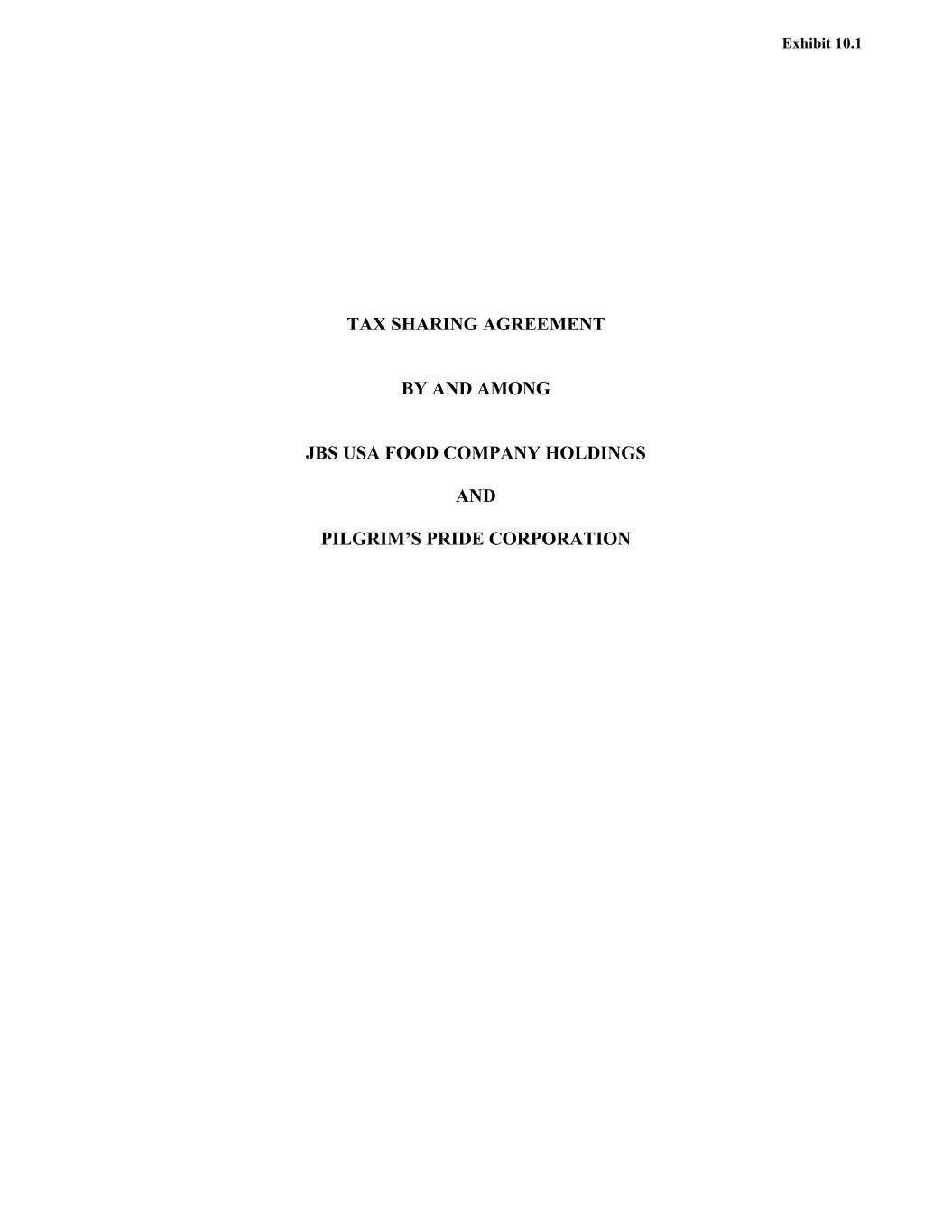
TAX SHARING AGREEMENT BY AND AMONG JBS USA FOOD COMPANY HOLDINGS AND PILGRIM’S PRIDE CORPORATION Exhibit 10.1
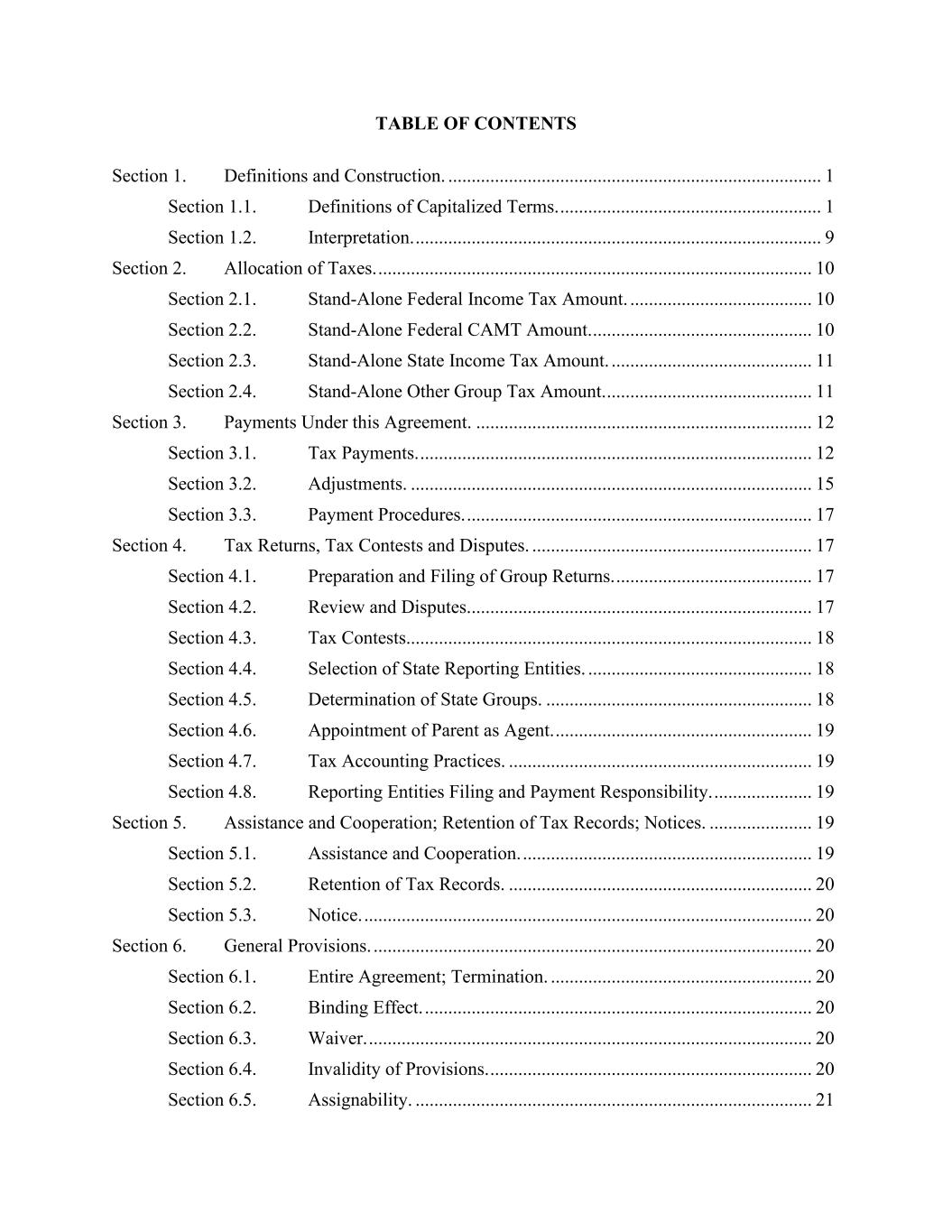
TABLE OF CONTENTS Section 1. Definitions and Construction. ................................................................................ 1 Section 1.1. Definitions of Capitalized Terms. ........................................................ 1 Section 1.2. Interpretation. ....................................................................................... 9 Section 2. Allocation of Taxes. ............................................................................................. 10 Section 2.1. Stand-Alone Federal Income Tax Amount. ....................................... 10 Section 2.2. Stand-Alone Federal CAMT Amount. ............................................... 10 Section 2.3. Stand-Alone State Income Tax Amount. ........................................... 11 Section 2.4. Stand-Alone Other Group Tax Amount. ............................................ 11 Section 3. Payments Under this Agreement. ........................................................................ 12 Section 3.1. Tax Payments. .................................................................................... 12 Section 3.2. Adjustments. ...................................................................................... 15 Section 3.3. Payment Procedures. .......................................................................... 17 Section 4. Tax Returns, Tax Contests and Disputes. ............................................................ 17 Section 4.1. Preparation and Filing of Group Returns. .......................................... 17 Section 4.2. Review and Disputes.......................................................................... 17 Section 4.3. Tax Contests....................................................................................... 18 Section 4.4. Selection of State Reporting Entities. ................................................ 18 Section 4.5. Determination of State Groups. ......................................................... 18 Section 4.6. Appointment of Parent as Agent. ....................................................... 19 Section 4.7. Tax Accounting Practices. ................................................................. 19 Section 4.8. Reporting Entities Filing and Payment Responsibility. ..................... 19 Section 5. Assistance and Cooperation; Retention of Tax Records; Notices. ...................... 19 Section 5.1. Assistance and Cooperation. .............................................................. 19 Section 5.2. Retention of Tax Records. ................................................................. 20 Section 5.3. Notice. ................................................................................................ 20 Section 6. General Provisions. .............................................................................................. 20 Section 6.1. Entire Agreement; Termination. ........................................................ 20 Section 6.2. Binding Effect. ................................................................................... 20 Section 6.3. Waiver. ............................................................................................... 20 Section 6.4. Invalidity of Provisions. ..................................................................... 20 Section 6.5. Assignability. ..................................................................................... 21
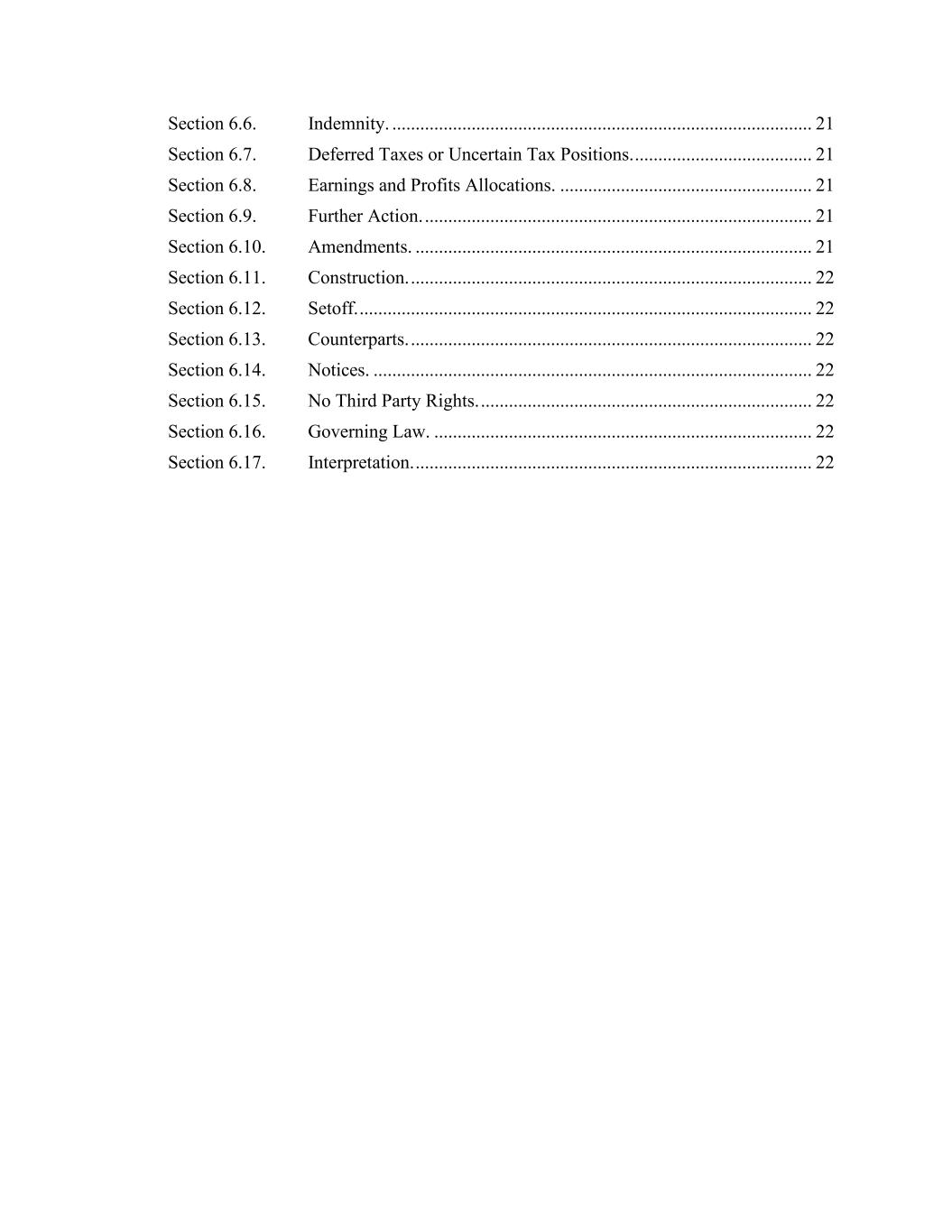
Section 6.6. Indemnity. .......................................................................................... 21 Section 6.7. Deferred Taxes or Uncertain Tax Positions. ...................................... 21 Section 6.8. Earnings and Profits Allocations. ...................................................... 21 Section 6.9. Further Action. ................................................................................... 21 Section 6.10. Amendments. ..................................................................................... 21 Section 6.11. Construction. ...................................................................................... 22 Section 6.12. Setoff. ................................................................................................. 22 Section 6.13. Counterparts. ...................................................................................... 22 Section 6.14. Notices. .............................................................................................. 22 Section 6.15. No Third Party Rights. ....................................................................... 22 Section 6.16. Governing Law. ................................................................................. 22 Section 6.17. Interpretation. ..................................................................................... 22
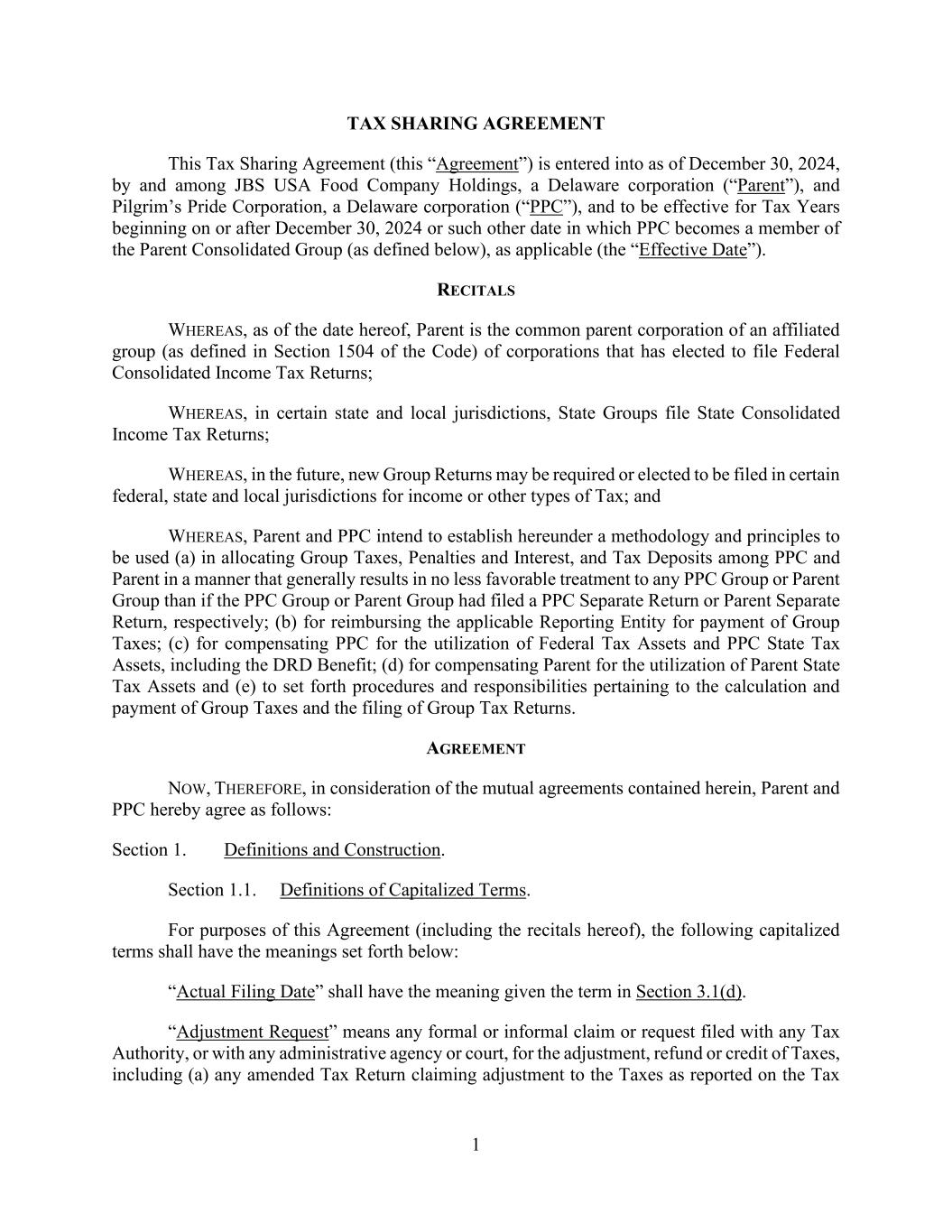
1 TAX SHARING AGREEMENT This Tax Sharing Agreement (this “Agreement”) is entered into as of December 30, 2024, by and among JBS USA Food Company Holdings, a Delaware corporation (“Parent”), and Pilgrim’s Pride Corporation, a Delaware corporation (“PPC”), and to be effective for Tax Years beginning on or after December 30, 2024 or such other date in which PPC becomes a member of the Parent Consolidated Group (as defined below), as applicable (the “Effective Date”). RECITALS WHEREAS, as of the date hereof, Parent is the common parent corporation of an affiliated group (as defined in Section 1504 of the Code) of corporations that has elected to file Federal Consolidated Income Tax Returns; WHEREAS, in certain state and local jurisdictions, State Groups file State Consolidated Income Tax Returns; WHEREAS, in the future, new Group Returns may be required or elected to be filed in certain federal, state and local jurisdictions for income or other types of Tax; and WHEREAS, Parent and PPC intend to establish hereunder a methodology and principles to be used (a) in allocating Group Taxes, Penalties and Interest, and Tax Deposits among PPC and Parent in a manner that generally results in no less favorable treatment to any PPC Group or Parent Group than if the PPC Group or Parent Group had filed a PPC Separate Return or Parent Separate Return, respectively; (b) for reimbursing the applicable Reporting Entity for payment of Group Taxes; (c) for compensating PPC for the utilization of Federal Tax Assets and PPC State Tax Assets, including the DRD Benefit; (d) for compensating Parent for the utilization of Parent State Tax Assets and (e) to set forth procedures and responsibilities pertaining to the calculation and payment of Group Taxes and the filing of Group Tax Returns. AGREEMENT NOW, THEREFORE, in consideration of the mutual agreements contained herein, Parent and PPC hereby agree as follows: Section 1. Definitions and Construction. Section 1.1. Definitions of Capitalized Terms. For purposes of this Agreement (including the recitals hereof), the following capitalized terms shall have the meanings set forth below: “Actual Filing Date” shall have the meaning given the term in Section 3.1(d). “Adjustment Request” means any formal or informal claim or request filed with any Tax Authority, or with any administrative agency or court, for the adjustment, refund or credit of Taxes, including (a) any amended Tax Return claiming adjustment to the Taxes as reported on the Tax
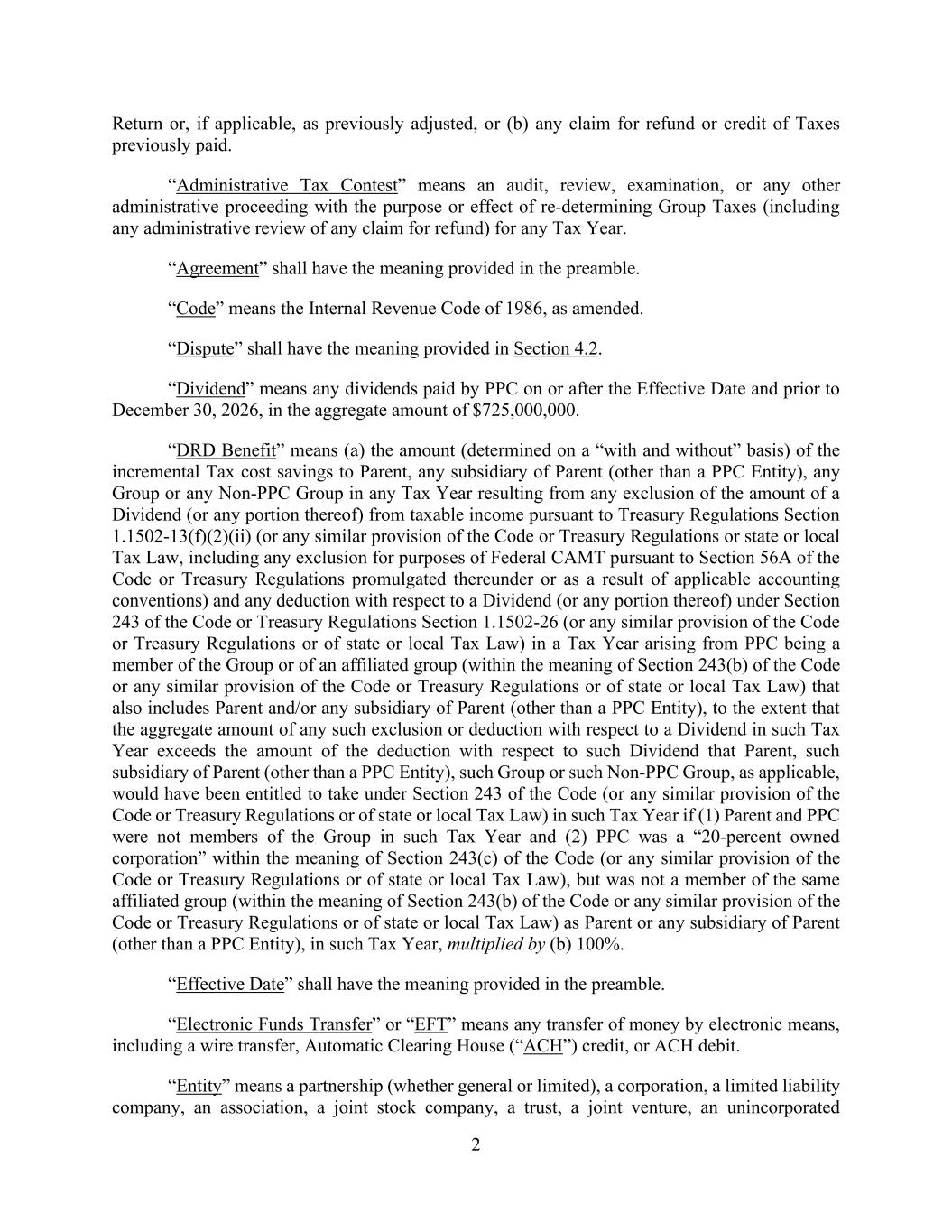
2 Return or, if applicable, as previously adjusted, or (b) any claim for refund or credit of Taxes previously paid. “Administrative Tax Contest” means an audit, review, examination, or any other administrative proceeding with the purpose or effect of re-determining Group Taxes (including any administrative review of any claim for refund) for any Tax Year. “Agreement” shall have the meaning provided in the preamble. “Code” means the Internal Revenue Code of 1986, as amended. “Dispute” shall have the meaning provided in Section 4.2. “Dividend” means any dividends paid by PPC on or after the Effective Date and prior to December 30, 2026, in the aggregate amount of $725,000,000. “DRD Benefit” means (a) the amount (determined on a “with and without” basis) of the incremental Tax cost savings to Parent, any subsidiary of Parent (other than a PPC Entity), any Group or any Non-PPC Group in any Tax Year resulting from any exclusion of the amount of a Dividend (or any portion thereof) from taxable income pursuant to Treasury Regulations Section 1.1502-13(f)(2)(ii) (or any similar provision of the Code or Treasury Regulations or state or local Tax Law, including any exclusion for purposes of Federal CAMT pursuant to Section 56A of the Code or Treasury Regulations promulgated thereunder or as a result of applicable accounting conventions) and any deduction with respect to a Dividend (or any portion thereof) under Section 243 of the Code or Treasury Regulations Section 1.1502-26 (or any similar provision of the Code or Treasury Regulations or of state or local Tax Law) in a Tax Year arising from PPC being a member of the Group or of an affiliated group (within the meaning of Section 243(b) of the Code or any similar provision of the Code or Treasury Regulations or of state or local Tax Law) that also includes Parent and/or any subsidiary of Parent (other than a PPC Entity), to the extent that the aggregate amount of any such exclusion or deduction with respect to a Dividend in such Tax Year exceeds the amount of the deduction with respect to such Dividend that Parent, such subsidiary of Parent (other than a PPC Entity), such Group or such Non-PPC Group, as applicable, would have been entitled to take under Section 243 of the Code (or any similar provision of the Code or Treasury Regulations or of state or local Tax Law) in such Tax Year if (1) Parent and PPC were not members of the Group in such Tax Year and (2) PPC was a “20-percent owned corporation” within the meaning of Section 243(c) of the Code (or any similar provision of the Code or Treasury Regulations or of state or local Tax Law), but was not a member of the same affiliated group (within the meaning of Section 243(b) of the Code or any similar provision of the Code or Treasury Regulations or of state or local Tax Law) as Parent or any subsidiary of Parent (other than a PPC Entity), in such Tax Year, multiplied by (b) 100%. “Effective Date” shall have the meaning provided in the preamble. “Electronic Funds Transfer” or “EFT” means any transfer of money by electronic means, including a wire transfer, Automatic Clearing House (“ACH”) credit, or ACH debit. “Entity” means a partnership (whether general or limited), a corporation, a limited liability company, an association, a joint stock company, a trust, a joint venture, an unincorporated
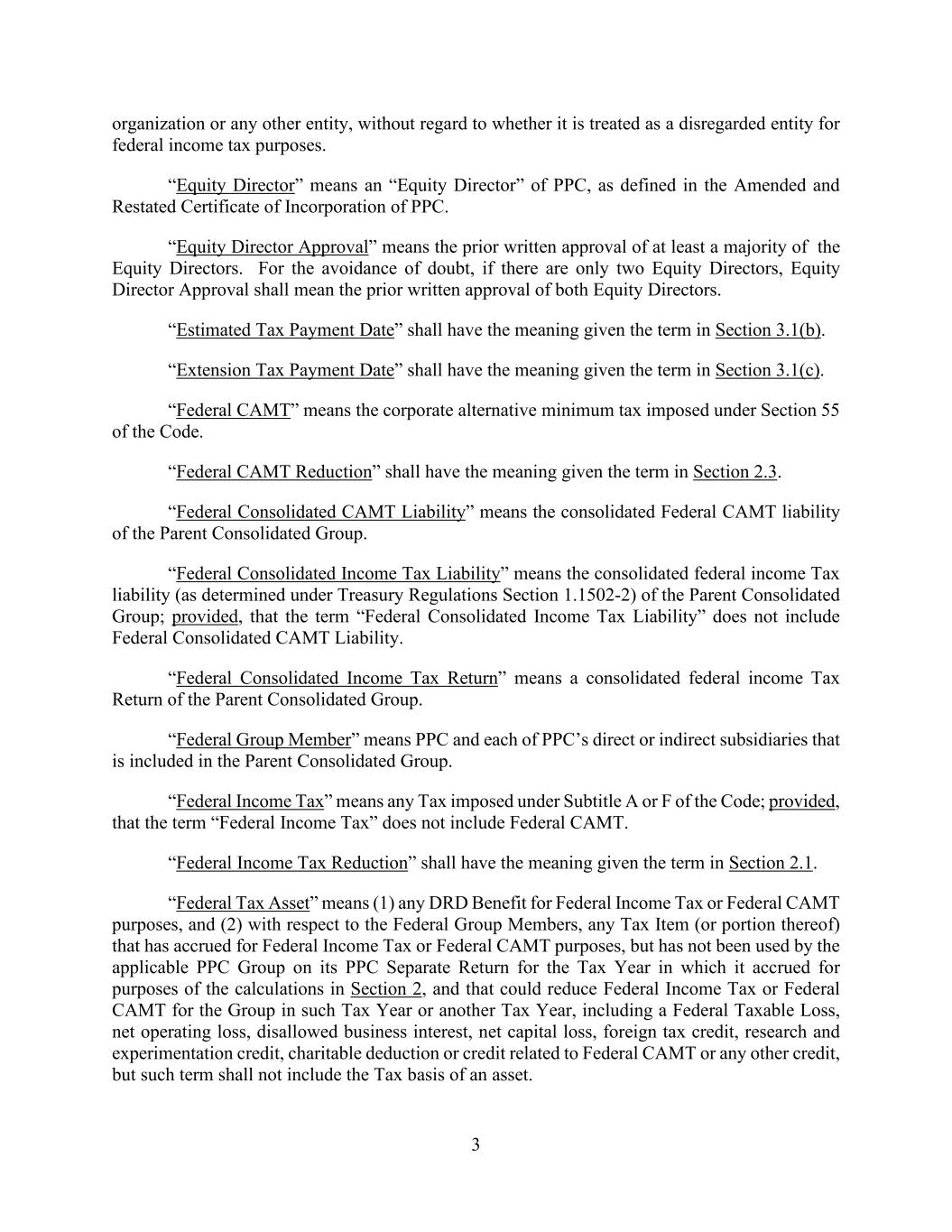
3 organization or any other entity, without regard to whether it is treated as a disregarded entity for federal income tax purposes. “Equity Director” means an “Equity Director” of PPC, as defined in the Amended and Restated Certificate of Incorporation of PPC. “Equity Director Approval” means the prior written approval of at least a majority of the Equity Directors. For the avoidance of doubt, if there are only two Equity Directors, Equity Director Approval shall mean the prior written approval of both Equity Directors. “Estimated Tax Payment Date” shall have the meaning given the term in Section 3.1(b). “Extension Tax Payment Date” shall have the meaning given the term in Section 3.1(c). “Federal CAMT” means the corporate alternative minimum tax imposed under Section 55 of the Code. “Federal CAMT Reduction” shall have the meaning given the term in Section 2.3. “Federal Consolidated CAMT Liability” means the consolidated Federal CAMT liability of the Parent Consolidated Group. “Federal Consolidated Income Tax Liability” means the consolidated federal income Tax liability (as determined under Treasury Regulations Section 1.1502-2) of the Parent Consolidated Group; provided, that the term “Federal Consolidated Income Tax Liability” does not include Federal Consolidated CAMT Liability. “Federal Consolidated Income Tax Return” means a consolidated federal income Tax Return of the Parent Consolidated Group. “Federal Group Member” means PPC and each of PPC’s direct or indirect subsidiaries that is included in the Parent Consolidated Group. “Federal Income Tax” means any Tax imposed under Subtitle A or F of the Code; provided, that the term “Federal Income Tax” does not include Federal CAMT. “Federal Income Tax Reduction” shall have the meaning given the term in Section 2.1. “Federal Tax Asset” means (1) any DRD Benefit for Federal Income Tax or Federal CAMT purposes, and (2) with respect to the Federal Group Members, any Tax Item (or portion thereof) that has accrued for Federal Income Tax or Federal CAMT purposes, but has not been used by the applicable PPC Group on its PPC Separate Return for the Tax Year in which it accrued for purposes of the calculations in Section 2, and that could reduce Federal Income Tax or Federal CAMT for the Group in such Tax Year or another Tax Year, including a Federal Taxable Loss, net operating loss, disallowed business interest, net capital loss, foreign tax credit, research and experimentation credit, charitable deduction or credit related to Federal CAMT or any other credit, but such term shall not include the Tax basis of an asset.
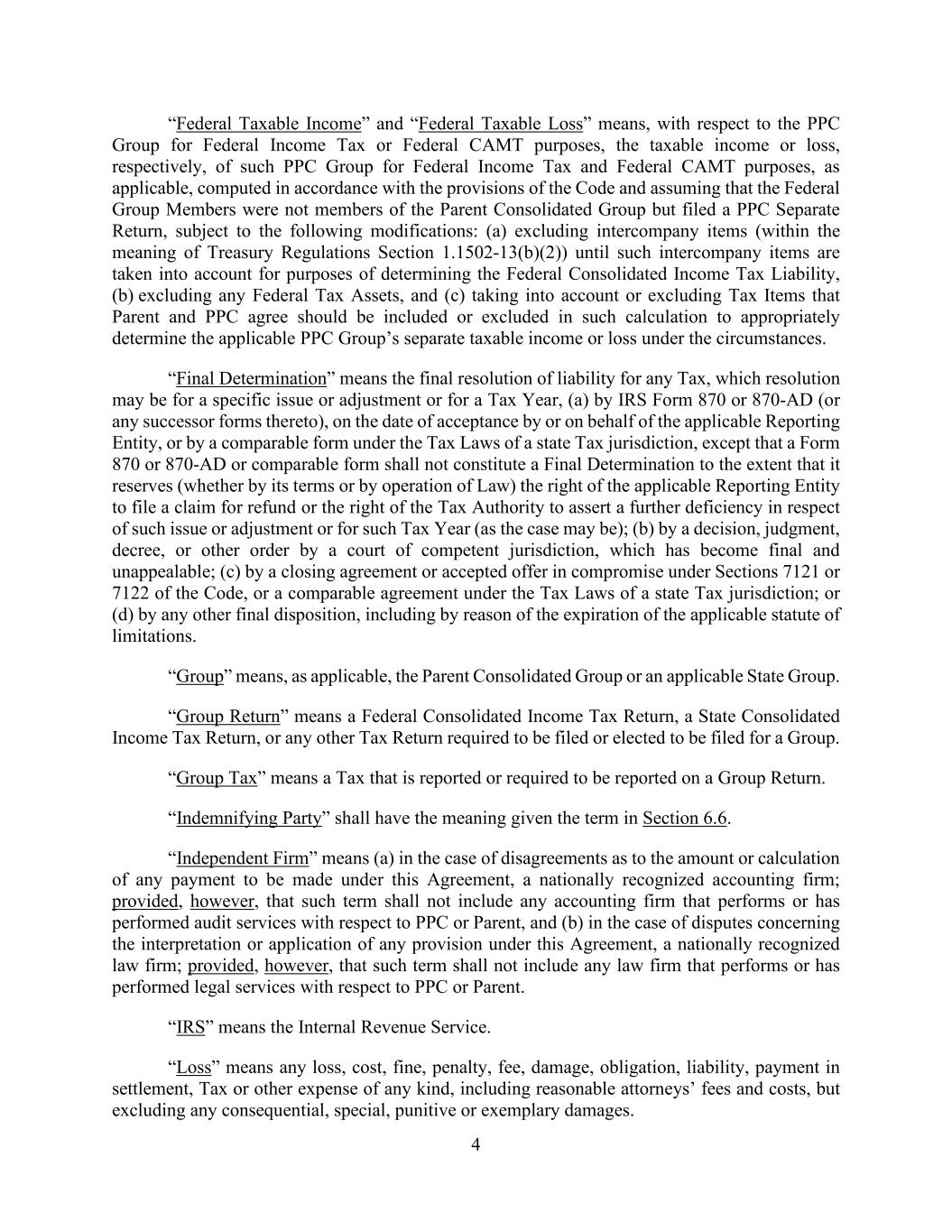
4 “Federal Taxable Income” and “Federal Taxable Loss” means, with respect to the PPC Group for Federal Income Tax or Federal CAMT purposes, the taxable income or loss, respectively, of such PPC Group for Federal Income Tax and Federal CAMT purposes, as applicable, computed in accordance with the provisions of the Code and assuming that the Federal Group Members were not members of the Parent Consolidated Group but filed a PPC Separate Return, subject to the following modifications: (a) excluding intercompany items (within the meaning of Treasury Regulations Section 1.1502-13(b)(2)) until such intercompany items are taken into account for purposes of determining the Federal Consolidated Income Tax Liability, (b) excluding any Federal Tax Assets, and (c) taking into account or excluding Tax Items that Parent and PPC agree should be included or excluded in such calculation to appropriately determine the applicable PPC Group’s separate taxable income or loss under the circumstances. “Final Determination” means the final resolution of liability for any Tax, which resolution may be for a specific issue or adjustment or for a Tax Year, (a) by IRS Form 870 or 870-AD (or any successor forms thereto), on the date of acceptance by or on behalf of the applicable Reporting Entity, or by a comparable form under the Tax Laws of a state Tax jurisdiction, except that a Form 870 or 870-AD or comparable form shall not constitute a Final Determination to the extent that it reserves (whether by its terms or by operation of Law) the right of the applicable Reporting Entity to file a claim for refund or the right of the Tax Authority to assert a further deficiency in respect of such issue or adjustment or for such Tax Year (as the case may be); (b) by a decision, judgment, decree, or other order by a court of competent jurisdiction, which has become final and unappealable; (c) by a closing agreement or accepted offer in compromise under Sections 7121 or 7122 of the Code, or a comparable agreement under the Tax Laws of a state Tax jurisdiction; or (d) by any other final disposition, including by reason of the expiration of the applicable statute of limitations. “Group” means, as applicable, the Parent Consolidated Group or an applicable State Group. “Group Return” means a Federal Consolidated Income Tax Return, a State Consolidated Income Tax Return, or any other Tax Return required to be filed or elected to be filed for a Group. “Group Tax” means a Tax that is reported or required to be reported on a Group Return. “Indemnifying Party” shall have the meaning given the term in Section 6.6. “Independent Firm” means (a) in the case of disagreements as to the amount or calculation of any payment to be made under this Agreement, a nationally recognized accounting firm; provided, however, that such term shall not include any accounting firm that performs or has performed audit services with respect to PPC or Parent, and (b) in the case of disputes concerning the interpretation or application of any provision under this Agreement, a nationally recognized law firm; provided, however, that such term shall not include any law firm that performs or has performed legal services with respect to PPC or Parent. “IRS” means the Internal Revenue Service. “Loss” means any loss, cost, fine, penalty, fee, damage, obligation, liability, payment in settlement, Tax or other expense of any kind, including reasonable attorneys’ fees and costs, but excluding any consequential, special, punitive or exemplary damages.

5 “Non-PPC Group” means any consolidated, combined or unitary group that includes Parent and/or one or more subsidiaries of Parent but does not include any PPC Entity. “Parent” shall have the meaning given the term in the preamble. “Parent Combined Prior Payments” shall have the meaning given the term in Section 3.1(d). “Parent Consolidated Group” means each corporation or other Entity that is classified as an association taxable as a corporation for Federal Income Tax and Federal CAMT purposes and that is a member of the affiliated group (as defined in Section 1504 of the Code) of corporations the common parent of which is Parent. “Parent Estimated Payment” shall have the meaning given the term in Section 3.1(b). “Parent Extension Payment” shall have the meaning given the term in Section 3.1(c). “Parent Group” means, with respect to any Tax Year for which Parent is a member of the applicable Group, (1) Parent and (2) any subsidiary of Parent (other than a PPC Entity) that is a member of such Group for such Tax Year. “Parent Other Group Tax Amount” shall have the meaning given the term in Section 2.4. “Parent Payment” shall have the meaning given the term in Section 3.1(a). “Parent Separate Return” means, with respect to a Tax, a hypothetical Tax Return of the applicable Parent Group for such Tax on a consolidated, combined, unitary or separate basis, as the case may be, that does not include PPC or any other PPC Entity. “Parent State Tax Asset” means, with respect to the applicable member of Parent Group, any Tax Item (or portion thereof) that has accrued for applicable State Income Tax purposes, but has not been used by the applicable Parent Group on its Parent Separate Return during the Tax Year in which it accrued for purposes of the calculations in Section 2, and that could reduce a State Income Tax in such Tax Year or another Tax Year for the applicable Group, including a net operating loss, net capital loss, disallowed business interest, research and experimentation credit, charitable deduction or any other credit, but such term shall not include the Tax basis of an asset. “Parent State Income Tax Amount” shall have the meaning given the term in Section 2.3. “Parent State Income Tax Reduction” shall have the meaning given the term in Section 2.3. “Parent Tax Asset Payment” shall have the meaning provided in Section 3.1(e). “Penalties and Interest” means, whether disputed or not, any interest, fines, penalties, assessments, or additions resulting from, attributable to, or incurred in connection with any Tax. “Person” means an individual, any Entity or a governmental entity or any department, agency or political subdivision thereof.
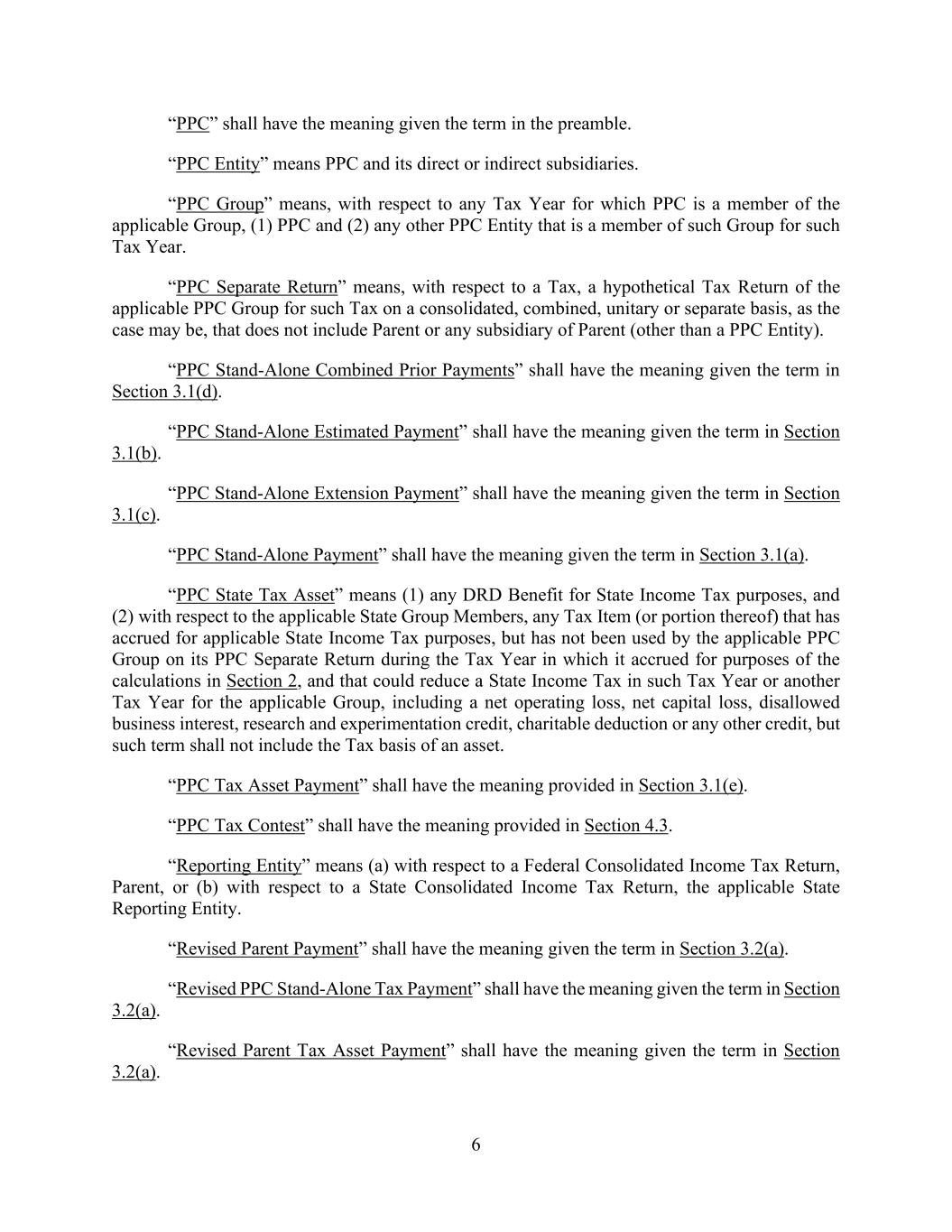
6 “PPC” shall have the meaning given the term in the preamble. “PPC Entity” means PPC and its direct or indirect subsidiaries. “PPC Group” means, with respect to any Tax Year for which PPC is a member of the applicable Group, (1) PPC and (2) any other PPC Entity that is a member of such Group for such Tax Year. “PPC Separate Return” means, with respect to a Tax, a hypothetical Tax Return of the applicable PPC Group for such Tax on a consolidated, combined, unitary or separate basis, as the case may be, that does not include Parent or any subsidiary of Parent (other than a PPC Entity). “PPC Stand-Alone Combined Prior Payments” shall have the meaning given the term in Section 3.1(d). “PPC Stand-Alone Estimated Payment” shall have the meaning given the term in Section 3.1(b). “PPC Stand-Alone Extension Payment” shall have the meaning given the term in Section 3.1(c). “PPC Stand-Alone Payment” shall have the meaning given the term in Section 3.1(a). “PPC State Tax Asset” means (1) any DRD Benefit for State Income Tax purposes, and (2) with respect to the applicable State Group Members, any Tax Item (or portion thereof) that has accrued for applicable State Income Tax purposes, but has not been used by the applicable PPC Group on its PPC Separate Return during the Tax Year in which it accrued for purposes of the calculations in Section 2, and that could reduce a State Income Tax in such Tax Year or another Tax Year for the applicable Group, including a net operating loss, net capital loss, disallowed business interest, research and experimentation credit, charitable deduction or any other credit, but such term shall not include the Tax basis of an asset. “PPC Tax Asset Payment” shall have the meaning provided in Section 3.1(e). “PPC Tax Contest” shall have the meaning provided in Section 4.3. “Reporting Entity” means (a) with respect to a Federal Consolidated Income Tax Return, Parent, or (b) with respect to a State Consolidated Income Tax Return, the applicable State Reporting Entity. “Revised Parent Payment” shall have the meaning given the term in Section 3.2(a). “Revised PPC Stand-Alone Tax Payment” shall have the meaning given the term in Section 3.2(a). “Revised Parent Tax Asset Payment” shall have the meaning given the term in Section 3.2(a).
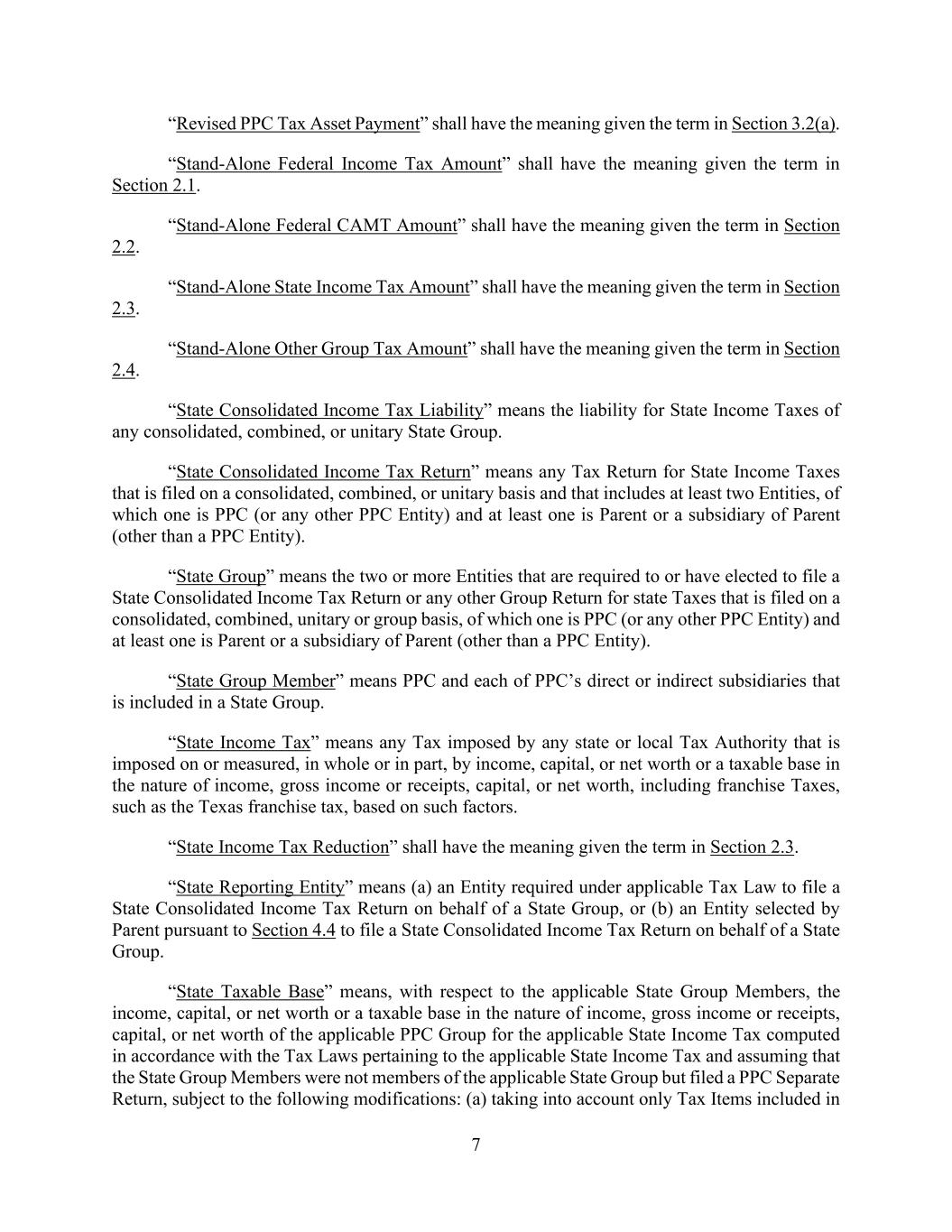
7 “Revised PPC Tax Asset Payment” shall have the meaning given the term in Section 3.2(a). “Stand-Alone Federal Income Tax Amount” shall have the meaning given the term in Section 2.1. “Stand-Alone Federal CAMT Amount” shall have the meaning given the term in Section 2.2. “Stand-Alone State Income Tax Amount” shall have the meaning given the term in Section 2.3. “Stand-Alone Other Group Tax Amount” shall have the meaning given the term in Section 2.4. “State Consolidated Income Tax Liability” means the liability for State Income Taxes of any consolidated, combined, or unitary State Group. “State Consolidated Income Tax Return” means any Tax Return for State Income Taxes that is filed on a consolidated, combined, or unitary basis and that includes at least two Entities, of which one is PPC (or any other PPC Entity) and at least one is Parent or a subsidiary of Parent (other than a PPC Entity). “State Group” means the two or more Entities that are required to or have elected to file a State Consolidated Income Tax Return or any other Group Return for state Taxes that is filed on a consolidated, combined, unitary or group basis, of which one is PPC (or any other PPC Entity) and at least one is Parent or a subsidiary of Parent (other than a PPC Entity). “State Group Member” means PPC and each of PPC’s direct or indirect subsidiaries that is included in a State Group. “State Income Tax” means any Tax imposed by any state or local Tax Authority that is imposed on or measured, in whole or in part, by income, capital, or net worth or a taxable base in the nature of income, gross income or receipts, capital, or net worth, including franchise Taxes, such as the Texas franchise tax, based on such factors. “State Income Tax Reduction” shall have the meaning given the term in Section 2.3. “State Reporting Entity” means (a) an Entity required under applicable Tax Law to file a State Consolidated Income Tax Return on behalf of a State Group, or (b) an Entity selected by Parent pursuant to Section 4.4 to file a State Consolidated Income Tax Return on behalf of a State Group. “State Taxable Base” means, with respect to the applicable State Group Members, the income, capital, or net worth or a taxable base in the nature of income, gross income or receipts, capital, or net worth of the applicable PPC Group for the applicable State Income Tax computed in accordance with the Tax Laws pertaining to the applicable State Income Tax and assuming that the State Group Members were not members of the applicable State Group but filed a PPC Separate Return, subject to the following modifications: (a) taking into account only Tax Items included in
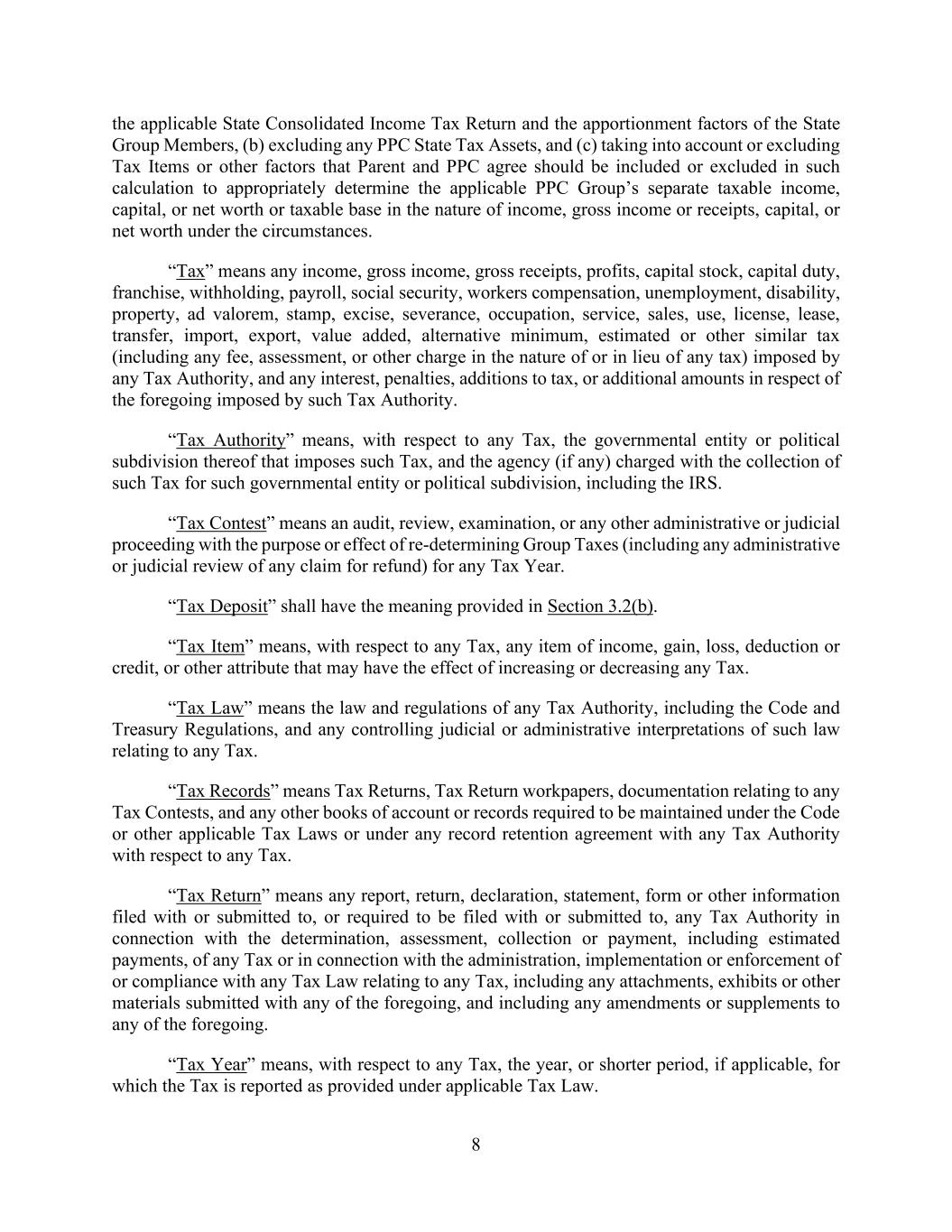
8 the applicable State Consolidated Income Tax Return and the apportionment factors of the State Group Members, (b) excluding any PPC State Tax Assets, and (c) taking into account or excluding Tax Items or other factors that Parent and PPC agree should be included or excluded in such calculation to appropriately determine the applicable PPC Group’s separate taxable income, capital, or net worth or taxable base in the nature of income, gross income or receipts, capital, or net worth under the circumstances. “Tax” means any income, gross income, gross receipts, profits, capital stock, capital duty, franchise, withholding, payroll, social security, workers compensation, unemployment, disability, property, ad valorem, stamp, excise, severance, occupation, service, sales, use, license, lease, transfer, import, export, value added, alternative minimum, estimated or other similar tax (including any fee, assessment, or other charge in the nature of or in lieu of any tax) imposed by any Tax Authority, and any interest, penalties, additions to tax, or additional amounts in respect of the foregoing imposed by such Tax Authority. “Tax Authority” means, with respect to any Tax, the governmental entity or political subdivision thereof that imposes such Tax, and the agency (if any) charged with the collection of such Tax for such governmental entity or political subdivision, including the IRS. “Tax Contest” means an audit, review, examination, or any other administrative or judicial proceeding with the purpose or effect of re-determining Group Taxes (including any administrative or judicial review of any claim for refund) for any Tax Year. “Tax Deposit” shall have the meaning provided in Section 3.2(b). “Tax Item” means, with respect to any Tax, any item of income, gain, loss, deduction or credit, or other attribute that may have the effect of increasing or decreasing any Tax. “Tax Law” means the law and regulations of any Tax Authority, including the Code and Treasury Regulations, and any controlling judicial or administrative interpretations of such law relating to any Tax. “Tax Records” means Tax Returns, Tax Return workpapers, documentation relating to any Tax Contests, and any other books of account or records required to be maintained under the Code or other applicable Tax Laws or under any record retention agreement with any Tax Authority with respect to any Tax. “Tax Return” means any report, return, declaration, statement, form or other information filed with or submitted to, or required to be filed with or submitted to, any Tax Authority in connection with the determination, assessment, collection or payment, including estimated payments, of any Tax or in connection with the administration, implementation or enforcement of or compliance with any Tax Law relating to any Tax, including any attachments, exhibits or other materials submitted with any of the foregoing, and including any amendments or supplements to any of the foregoing. “Tax Year” means, with respect to any Tax, the year, or shorter period, if applicable, for which the Tax is reported as provided under applicable Tax Law.
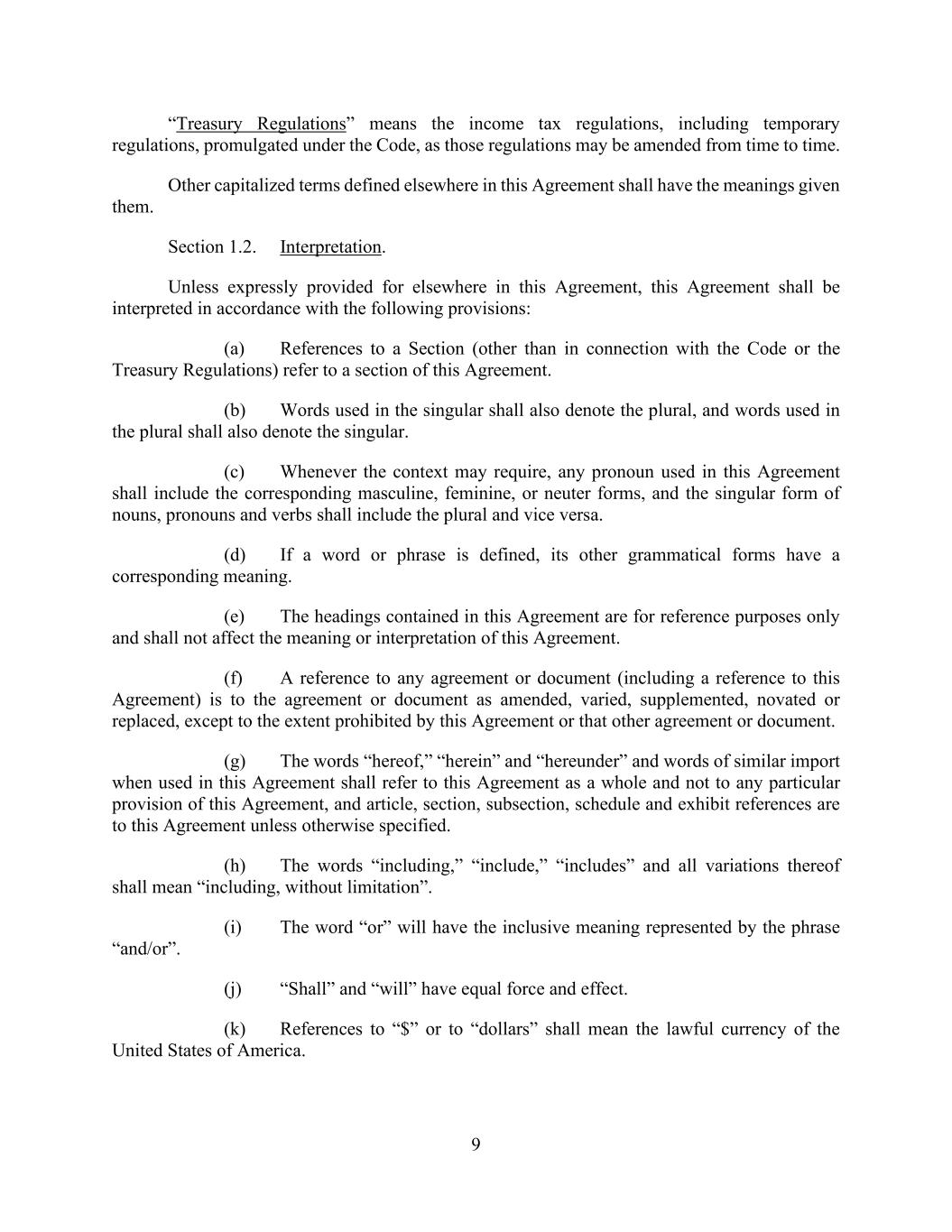
9 “Treasury Regulations” means the income tax regulations, including temporary regulations, promulgated under the Code, as those regulations may be amended from time to time. Other capitalized terms defined elsewhere in this Agreement shall have the meanings given them. Section 1.2. Interpretation. Unless expressly provided for elsewhere in this Agreement, this Agreement shall be interpreted in accordance with the following provisions: (a) References to a Section (other than in connection with the Code or the Treasury Regulations) refer to a section of this Agreement. (b) Words used in the singular shall also denote the plural, and words used in the plural shall also denote the singular. (c) Whenever the context may require, any pronoun used in this Agreement shall include the corresponding masculine, feminine, or neuter forms, and the singular form of nouns, pronouns and verbs shall include the plural and vice versa. (d) If a word or phrase is defined, its other grammatical forms have a corresponding meaning. (e) The headings contained in this Agreement are for reference purposes only and shall not affect the meaning or interpretation of this Agreement. (f) A reference to any agreement or document (including a reference to this Agreement) is to the agreement or document as amended, varied, supplemented, novated or replaced, except to the extent prohibited by this Agreement or that other agreement or document. (g) The words “hereof,” “herein” and “hereunder” and words of similar import when used in this Agreement shall refer to this Agreement as a whole and not to any particular provision of this Agreement, and article, section, subsection, schedule and exhibit references are to this Agreement unless otherwise specified. (h) The words “including,” “include,” “includes” and all variations thereof shall mean “including, without limitation”. (i) The word “or” will have the inclusive meaning represented by the phrase “and/or”. (j) “Shall” and “will” have equal force and effect. (k) References to “$” or to “dollars” shall mean the lawful currency of the United States of America.

10 (l) If any period of days referred to in this Agreement ends on a day that is a Saturday, a Sunday or a holiday on which national banking associations in the State of Texas are closed, then the expiration of such period shall be automatically extended until the first succeeding day that is not a Saturday, a Sunday or a holiday on which national banking associations in the State of Texas are closed. Section 2. Allocation of Taxes. Section 2.1. Stand-Alone Federal Income Tax Amount. For each Tax Year, PPC shall owe to the applicable Reporting Entity the amount of the Federal Income Tax liability the PPC Group for Federal Income Tax purposes would have incurred for such Tax Year if such PPC Group filed its own PPC Separate Return for Federal Income Tax purposes based solely on its own Federal Taxable Income and taking into account such reasonable assumptions and administrative convenience conventions that are appropriate to calculate such amount (and shall be subject to payment pursuant to Section 3.1(a) through Section 3.1(d)) (the “Stand-Alone Federal Income Tax Amount”). If a Federal Tax Asset of a Federal Group Member or such PPC Group is utilized by the Parent Consolidated Group in determining the Federal Consolidated Income Tax Liability, the Stand-Alone Federal Income Tax Amount shall be reduced by the amount of the resulting reduction in the Federal Consolidated Income Tax Liability attributable to such utilization (a “Federal Income Tax Reduction”). For the avoidance of doubt, after making the reduction set forth in the previous sentence, the Stand-Alone Federal Income Tax Amount may be negative (and shall be subject to payment pursuant to Section 3.1(e)). Section 2.2. Stand-Alone Federal CAMT Amount. For each Tax Year, PPC shall owe to the applicable Reporting Entity the amount of the Federal CAMT liability the PPC Group for Federal CAMT purposes would have incurred for such Tax Year if such PPC Group filed its own PPC Separate Return for Federal CAMT purposes based solely on its own Federal Taxable Income and taking into account such reasonable assumptions and administrative convenience conventions that are appropriate to calculate such amount (and shall be subject to payment pursuant to Section 3.1(a) through Section 3.1(d)) (the “Stand-Alone Federal CAMT Amount”); provided, however, that the amount owed by PPC pursuant to this Section 2.2 for a particular Tax Year (and, therefore, the Stand-Alone Federal CAMT Amount for such Tax Year) shall not exceed the amount of the Federal Consolidated CAMT Liability actually incurred by the Parent Consolidated Group for such Tax Year. If a Federal Tax Asset of a Federal Group Member or such PPC Group is utilized by the Parent Consolidated Group in determining the Federal Consolidated CAMT Liability, the Stand- Alone Federal CAMT Amount shall be reduced by the amount of the resulting reduction in the Federal Consolidated CAMT Liability attributable to such utilization (a “Federal CAMT Reduction”). For the avoidance of doubt, after making the reduction set forth in the previous sentence, the Stand-Alone Federal CAMT Amount may be negative (and shall be subject to payment pursuant to Section 3.1(e)).
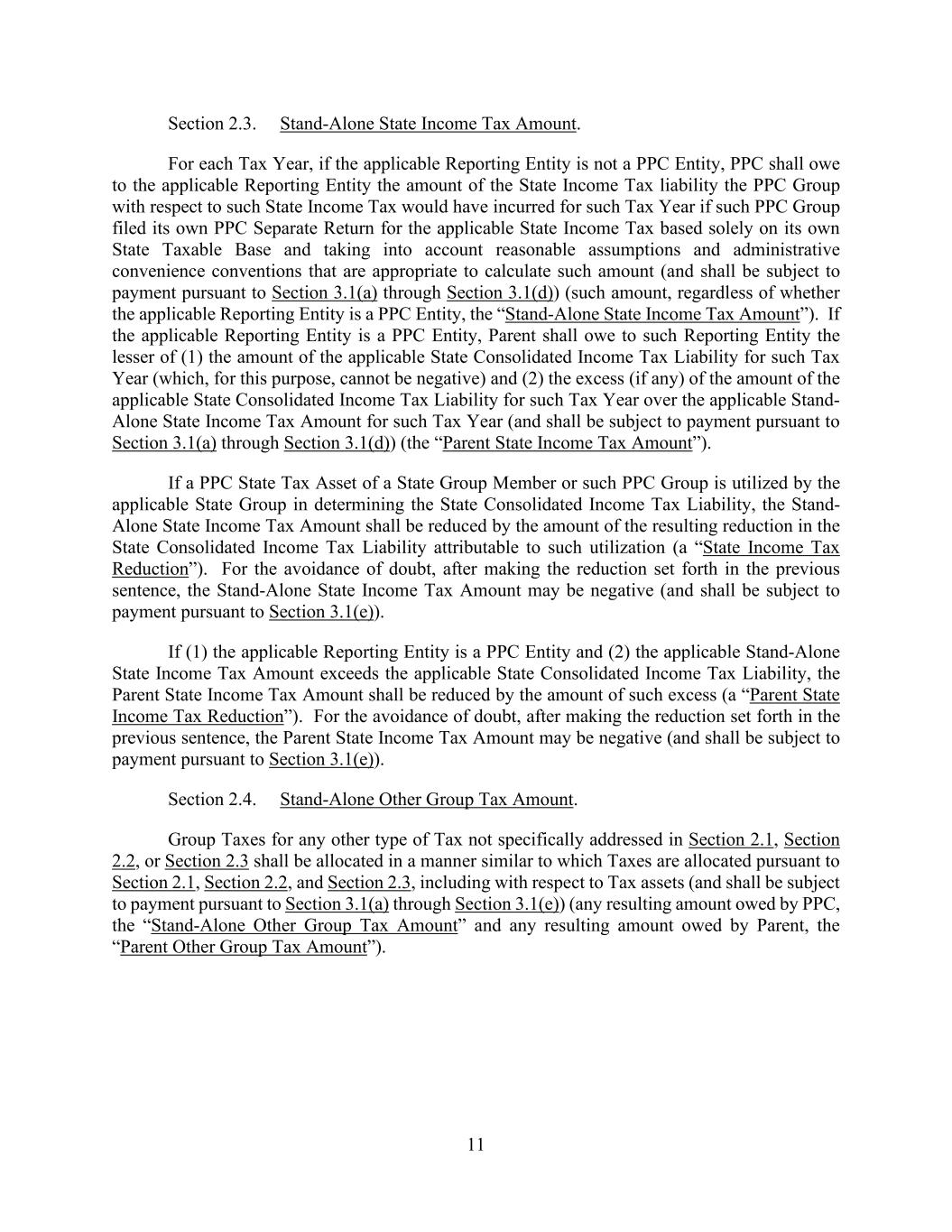
11 Section 2.3. Stand-Alone State Income Tax Amount. For each Tax Year, if the applicable Reporting Entity is not a PPC Entity, PPC shall owe to the applicable Reporting Entity the amount of the State Income Tax liability the PPC Group with respect to such State Income Tax would have incurred for such Tax Year if such PPC Group filed its own PPC Separate Return for the applicable State Income Tax based solely on its own State Taxable Base and taking into account reasonable assumptions and administrative convenience conventions that are appropriate to calculate such amount (and shall be subject to payment pursuant to Section 3.1(a) through Section 3.1(d)) (such amount, regardless of whether the applicable Reporting Entity is a PPC Entity, the “Stand-Alone State Income Tax Amount”). If the applicable Reporting Entity is a PPC Entity, Parent shall owe to such Reporting Entity the lesser of (1) the amount of the applicable State Consolidated Income Tax Liability for such Tax Year (which, for this purpose, cannot be negative) and (2) the excess (if any) of the amount of the applicable State Consolidated Income Tax Liability for such Tax Year over the applicable Stand- Alone State Income Tax Amount for such Tax Year (and shall be subject to payment pursuant to Section 3.1(a) through Section 3.1(d)) (the “Parent State Income Tax Amount”). If a PPC State Tax Asset of a State Group Member or such PPC Group is utilized by the applicable State Group in determining the State Consolidated Income Tax Liability, the Stand- Alone State Income Tax Amount shall be reduced by the amount of the resulting reduction in the State Consolidated Income Tax Liability attributable to such utilization (a “State Income Tax Reduction”). For the avoidance of doubt, after making the reduction set forth in the previous sentence, the Stand-Alone State Income Tax Amount may be negative (and shall be subject to payment pursuant to Section 3.1(e)). If (1) the applicable Reporting Entity is a PPC Entity and (2) the applicable Stand-Alone State Income Tax Amount exceeds the applicable State Consolidated Income Tax Liability, the Parent State Income Tax Amount shall be reduced by the amount of such excess (a “Parent State Income Tax Reduction”). For the avoidance of doubt, after making the reduction set forth in the previous sentence, the Parent State Income Tax Amount may be negative (and shall be subject to payment pursuant to Section 3.1(e)). Section 2.4. Stand-Alone Other Group Tax Amount. Group Taxes for any other type of Tax not specifically addressed in Section 2.1, Section 2.2, or Section 2.3 shall be allocated in a manner similar to which Taxes are allocated pursuant to Section 2.1, Section 2.2, and Section 2.3, including with respect to Tax assets (and shall be subject to payment pursuant to Section 3.1(a) through Section 3.1(e)) (any resulting amount owed by PPC, the “Stand-Alone Other Group Tax Amount” and any resulting amount owed by Parent, the “Parent Other Group Tax Amount”).
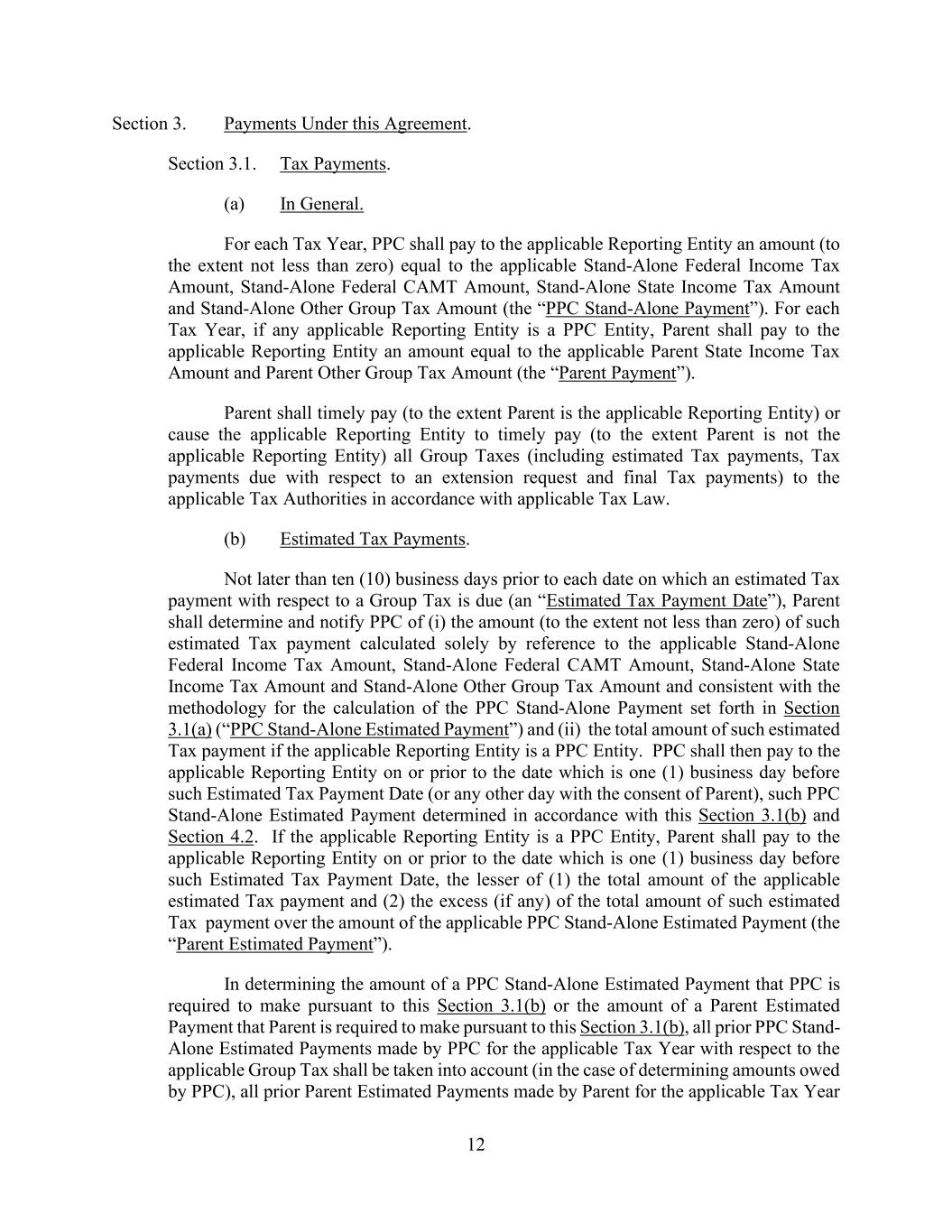
12 Section 3. Payments Under this Agreement. Section 3.1. Tax Payments. (a) In General. For each Tax Year, PPC shall pay to the applicable Reporting Entity an amount (to the extent not less than zero) equal to the applicable Stand-Alone Federal Income Tax Amount, Stand-Alone Federal CAMT Amount, Stand-Alone State Income Tax Amount and Stand-Alone Other Group Tax Amount (the “PPC Stand-Alone Payment”). For each Tax Year, if any applicable Reporting Entity is a PPC Entity, Parent shall pay to the applicable Reporting Entity an amount equal to the applicable Parent State Income Tax Amount and Parent Other Group Tax Amount (the “Parent Payment”). Parent shall timely pay (to the extent Parent is the applicable Reporting Entity) or cause the applicable Reporting Entity to timely pay (to the extent Parent is not the applicable Reporting Entity) all Group Taxes (including estimated Tax payments, Tax payments due with respect to an extension request and final Tax payments) to the applicable Tax Authorities in accordance with applicable Tax Law. (b) Estimated Tax Payments. Not later than ten (10) business days prior to each date on which an estimated Tax payment with respect to a Group Tax is due (an “Estimated Tax Payment Date”), Parent shall determine and notify PPC of (i) the amount (to the extent not less than zero) of such estimated Tax payment calculated solely by reference to the applicable Stand-Alone Federal Income Tax Amount, Stand-Alone Federal CAMT Amount, Stand-Alone State Income Tax Amount and Stand-Alone Other Group Tax Amount and consistent with the methodology for the calculation of the PPC Stand-Alone Payment set forth in Section 3.1(a) (“PPC Stand-Alone Estimated Payment”) and (ii) the total amount of such estimated Tax payment if the applicable Reporting Entity is a PPC Entity. PPC shall then pay to the applicable Reporting Entity on or prior to the date which is one (1) business day before such Estimated Tax Payment Date (or any other day with the consent of Parent), such PPC Stand-Alone Estimated Payment determined in accordance with this Section 3.1(b) and Section 4.2. If the applicable Reporting Entity is a PPC Entity, Parent shall pay to the applicable Reporting Entity on or prior to the date which is one (1) business day before such Estimated Tax Payment Date, the lesser of (1) the total amount of the applicable estimated Tax payment and (2) the excess (if any) of the total amount of such estimated Tax payment over the amount of the applicable PPC Stand-Alone Estimated Payment (the “Parent Estimated Payment”). In determining the amount of a PPC Stand-Alone Estimated Payment that PPC is required to make pursuant to this Section 3.1(b) or the amount of a Parent Estimated Payment that Parent is required to make pursuant to this Section 3.1(b), all prior PPC Stand- Alone Estimated Payments made by PPC for the applicable Tax Year with respect to the applicable Group Tax shall be taken into account (in the case of determining amounts owed by PPC), all prior Parent Estimated Payments made by Parent for the applicable Tax Year
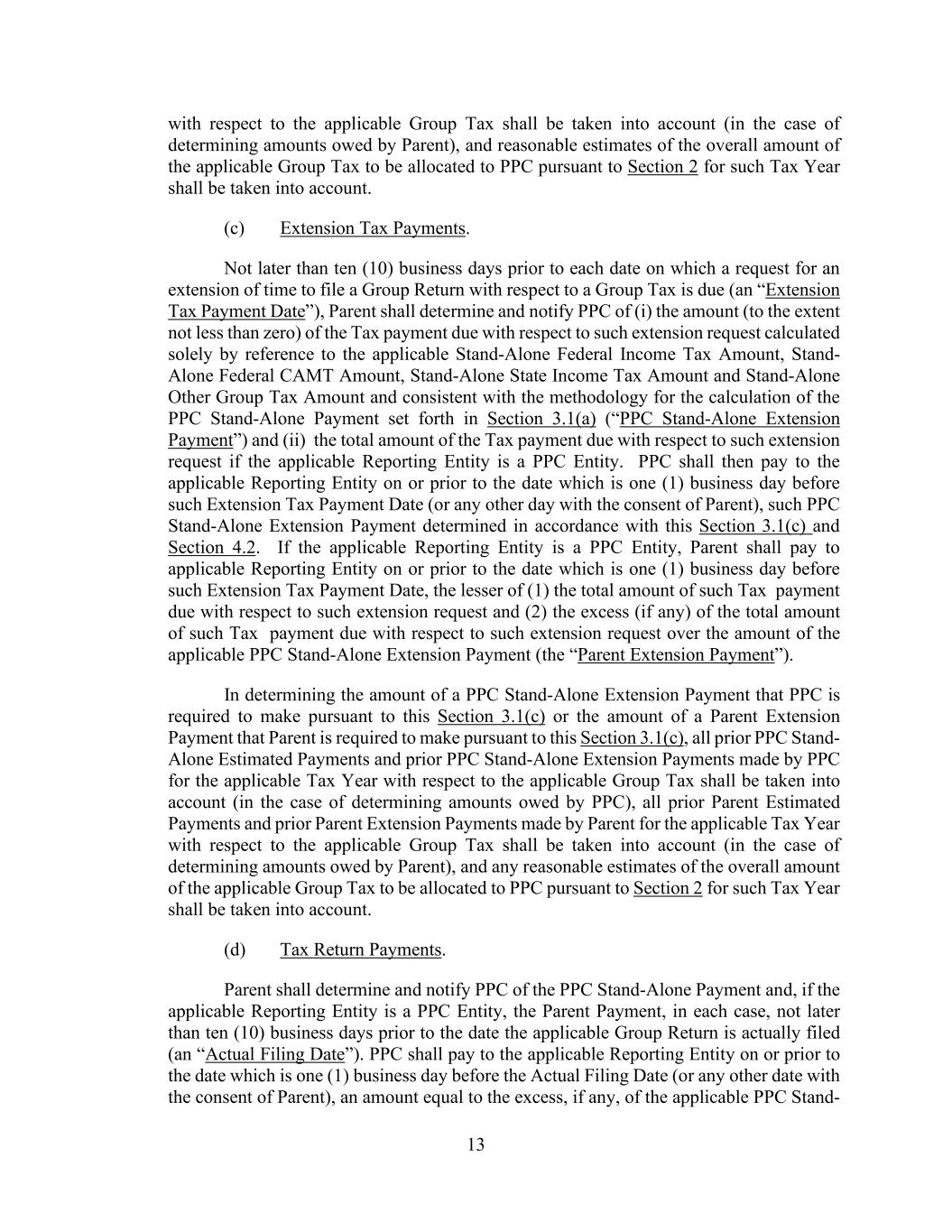
13 with respect to the applicable Group Tax shall be taken into account (in the case of determining amounts owed by Parent), and reasonable estimates of the overall amount of the applicable Group Tax to be allocated to PPC pursuant to Section 2 for such Tax Year shall be taken into account. (c) Extension Tax Payments. Not later than ten (10) business days prior to each date on which a request for an extension of time to file a Group Return with respect to a Group Tax is due (an “Extension Tax Payment Date”), Parent shall determine and notify PPC of (i) the amount (to the extent not less than zero) of the Tax payment due with respect to such extension request calculated solely by reference to the applicable Stand-Alone Federal Income Tax Amount, Stand- Alone Federal CAMT Amount, Stand-Alone State Income Tax Amount and Stand-Alone Other Group Tax Amount and consistent with the methodology for the calculation of the PPC Stand-Alone Payment set forth in Section 3.1(a) (“PPC Stand-Alone Extension Payment”) and (ii) the total amount of the Tax payment due with respect to such extension request if the applicable Reporting Entity is a PPC Entity. PPC shall then pay to the applicable Reporting Entity on or prior to the date which is one (1) business day before such Extension Tax Payment Date (or any other day with the consent of Parent), such PPC Stand-Alone Extension Payment determined in accordance with this Section 3.1(c) and Section 4.2. If the applicable Reporting Entity is a PPC Entity, Parent shall pay to applicable Reporting Entity on or prior to the date which is one (1) business day before such Extension Tax Payment Date, the lesser of (1) the total amount of such Tax payment due with respect to such extension request and (2) the excess (if any) of the total amount of such Tax payment due with respect to such extension request over the amount of the applicable PPC Stand-Alone Extension Payment (the “Parent Extension Payment”). In determining the amount of a PPC Stand-Alone Extension Payment that PPC is required to make pursuant to this Section 3.1(c) or the amount of a Parent Extension Payment that Parent is required to make pursuant to this Section 3.1(c), all prior PPC Stand- Alone Estimated Payments and prior PPC Stand-Alone Extension Payments made by PPC for the applicable Tax Year with respect to the applicable Group Tax shall be taken into account (in the case of determining amounts owed by PPC), all prior Parent Estimated Payments and prior Parent Extension Payments made by Parent for the applicable Tax Year with respect to the applicable Group Tax shall be taken into account (in the case of determining amounts owed by Parent), and any reasonable estimates of the overall amount of the applicable Group Tax to be allocated to PPC pursuant to Section 2 for such Tax Year shall be taken into account. (d) Tax Return Payments. Parent shall determine and notify PPC of the PPC Stand-Alone Payment and, if the applicable Reporting Entity is a PPC Entity, the Parent Payment, in each case, not later than ten (10) business days prior to the date the applicable Group Return is actually filed (an “Actual Filing Date”). PPC shall pay to the applicable Reporting Entity on or prior to the date which is one (1) business day before the Actual Filing Date (or any other date with the consent of Parent), an amount equal to the excess, if any, of the applicable PPC Stand-
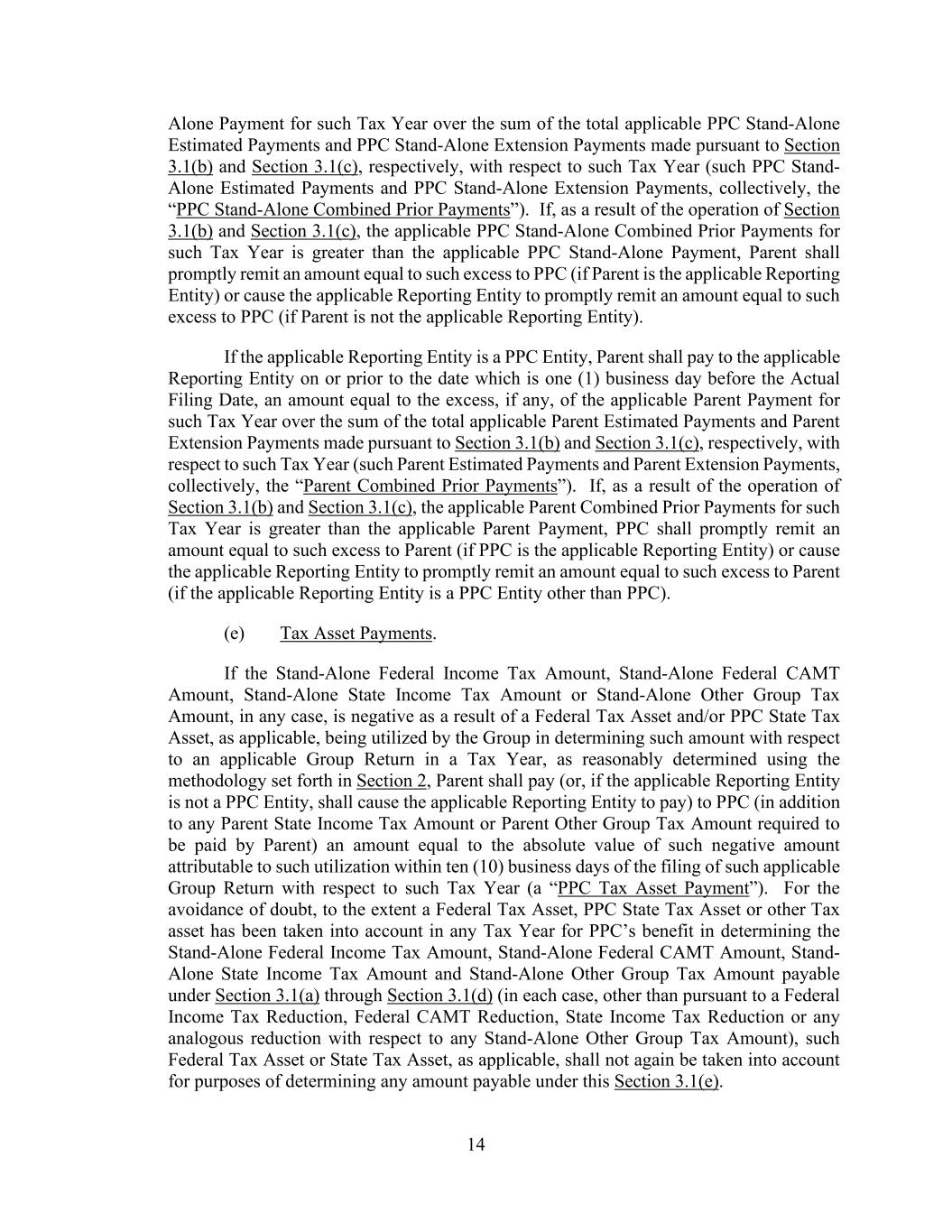
14 Alone Payment for such Tax Year over the sum of the total applicable PPC Stand-Alone Estimated Payments and PPC Stand-Alone Extension Payments made pursuant to Section 3.1(b) and Section 3.1(c), respectively, with respect to such Tax Year (such PPC Stand- Alone Estimated Payments and PPC Stand-Alone Extension Payments, collectively, the “PPC Stand-Alone Combined Prior Payments”). If, as a result of the operation of Section 3.1(b) and Section 3.1(c), the applicable PPC Stand-Alone Combined Prior Payments for such Tax Year is greater than the applicable PPC Stand-Alone Payment, Parent shall promptly remit an amount equal to such excess to PPC (if Parent is the applicable Reporting Entity) or cause the applicable Reporting Entity to promptly remit an amount equal to such excess to PPC (if Parent is not the applicable Reporting Entity). If the applicable Reporting Entity is a PPC Entity, Parent shall pay to the applicable Reporting Entity on or prior to the date which is one (1) business day before the Actual Filing Date, an amount equal to the excess, if any, of the applicable Parent Payment for such Tax Year over the sum of the total applicable Parent Estimated Payments and Parent Extension Payments made pursuant to Section 3.1(b) and Section 3.1(c), respectively, with respect to such Tax Year (such Parent Estimated Payments and Parent Extension Payments, collectively, the “Parent Combined Prior Payments”). If, as a result of the operation of Section 3.1(b) and Section 3.1(c), the applicable Parent Combined Prior Payments for such Tax Year is greater than the applicable Parent Payment, PPC shall promptly remit an amount equal to such excess to Parent (if PPC is the applicable Reporting Entity) or cause the applicable Reporting Entity to promptly remit an amount equal to such excess to Parent (if the applicable Reporting Entity is a PPC Entity other than PPC). (e) Tax Asset Payments. If the Stand-Alone Federal Income Tax Amount, Stand-Alone Federal CAMT Amount, Stand-Alone State Income Tax Amount or Stand-Alone Other Group Tax Amount, in any case, is negative as a result of a Federal Tax Asset and/or PPC State Tax Asset, as applicable, being utilized by the Group in determining such amount with respect to an applicable Group Return in a Tax Year, as reasonably determined using the methodology set forth in Section 2, Parent shall pay (or, if the applicable Reporting Entity is not a PPC Entity, shall cause the applicable Reporting Entity to pay) to PPC (in addition to any Parent State Income Tax Amount or Parent Other Group Tax Amount required to be paid by Parent) an amount equal to the absolute value of such negative amount attributable to such utilization within ten (10) business days of the filing of such applicable Group Return with respect to such Tax Year (a “PPC Tax Asset Payment”). For the avoidance of doubt, to the extent a Federal Tax Asset, PPC State Tax Asset or other Tax asset has been taken into account in any Tax Year for PPC’s benefit in determining the Stand-Alone Federal Income Tax Amount, Stand-Alone Federal CAMT Amount, Stand- Alone State Income Tax Amount and Stand-Alone Other Group Tax Amount payable under Section 3.1(a) through Section 3.1(d) (in each case, other than pursuant to a Federal Income Tax Reduction, Federal CAMT Reduction, State Income Tax Reduction or any analogous reduction with respect to any Stand-Alone Other Group Tax Amount), such Federal Tax Asset or State Tax Asset, as applicable, shall not again be taken into account for purposes of determining any amount payable under this Section 3.1(e).

15 If the Parent State Income Tax Amount is negative as a result of a Parent State Tax Asset being utilized by the Group in determining such amount with respect to an applicable Group Return (for which the Reporting Entity is a PPC Entity) in a Tax Year, as reasonably determined using the methodology set forth in Section 2, PPC shall pay (or shall cause the applicable Reporting Entity to pay) to Parent an amount equal to the absolute value of such negative amount attributable to such utilization within ten (10) business days of the filing of such applicable Group Return with respect to such Tax Year (a “Parent Tax Asset Payment”). For the avoidance of doubt, to the extent a Parent State Tax Asset has been taken into account in any Tax Year for Parent’s benefit in determining the Parent State Income Tax Amount payable under Section 3.1(a) through Section 3.1(d) (other than pursuant to a Parent State Income Tax Reduction), such Parent State Tax Asset shall not again be taken into account for purposes of determining any amount payable under this Section 3.1(e). Section 3.2. Adjustments. (a) Revised Tax Payments. If there is any adjustment to any Tax Items for a particular Tax and Tax Year, whether as a result of a Tax Contest, Adjustment Request, the resolution of a Dispute, or otherwise (an “Adjustment”), Parent shall redetermine the amount of the PPC Stand-Alone Payment due under Section 3.1 (a “Revised PPC Stand-Alone Payment”), the PPC Tax Asset Payment due under Section 3.1(e) (a “Revised PPC Tax Asset Payment”), the Parent Tax Asset Payment due under Section 3.1(e) (a “Revised Parent Tax Asset Payment”) and the Parent Payment due under Section 3.1 (a “Revised Parent Payment”) with respect to such Tax and Tax Year and promptly provide notice to PPC of such Revised PPC Stand- Alone Payment, Revised PPC Tax Asset Payment, Revised Parent Tax Asset Payment and Revised Parent Payment, as applicable; provided, however, that in the case of an Adjustment arising as a result of a Tax Contest, without the prior written consent of PPC (such consent not to be unreasonably withheld, conditioned or delayed), Parent shall only make a redetermination, calculate the applicable Revised PPC Stand-Alone Tax Payment and Revised Parent Payment, as applicable, and provide the applicable notices pursuant to this Section 3.2 (i) in the case of an Administrative Tax Contest, after the completion of the administrative proceeding by the applicable Tax Authority, or (ii) in the case of any other Tax Contest, a Final Determination of such Tax Contest. In calculating the Revised PPC Stand-Alone Payment and Revised Parent Payment, as applicable, only Penalties and Interest actually imposed by or received from a Tax Authority in connection with an Adjustment shall be included in such Revised PPC Stand-Alone Payment and Revised Parent Payment, as applicable, and then only to the extent and in proportion to the amount that PPC or Parent, as applicable, contributed to the imposition or receipt of such Penalties and Interest. If the amount of the Revised PPC Stand-Alone Payment exceeds the net amount of the applicable payments previously paid by PPC under Section 3.1 or this Section 3.2 (in each case, with respect solely to PPC Stand-Alone Payments or adjustments thereto), PPC shall promptly pay to the applicable Reporting Entity the amount of such excess promptly after PPC’s receipt of the notice from Parent of such Revised PPC Stand-Alone Payment
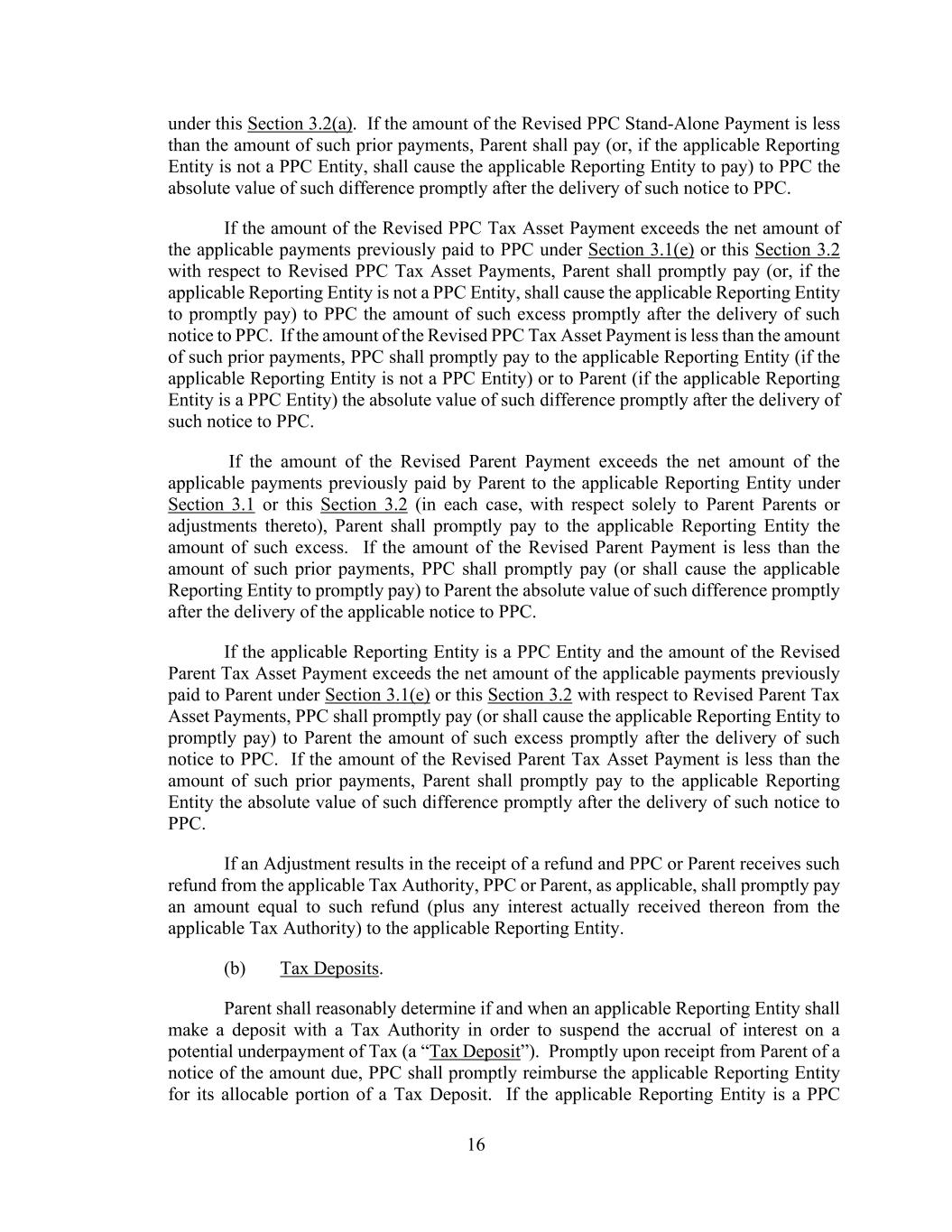
16 under this Section 3.2(a). If the amount of the Revised PPC Stand-Alone Payment is less than the amount of such prior payments, Parent shall pay (or, if the applicable Reporting Entity is not a PPC Entity, shall cause the applicable Reporting Entity to pay) to PPC the absolute value of such difference promptly after the delivery of such notice to PPC. If the amount of the Revised PPC Tax Asset Payment exceeds the net amount of the applicable payments previously paid to PPC under Section 3.1(e) or this Section 3.2 with respect to Revised PPC Tax Asset Payments, Parent shall promptly pay (or, if the applicable Reporting Entity is not a PPC Entity, shall cause the applicable Reporting Entity to promptly pay) to PPC the amount of such excess promptly after the delivery of such notice to PPC. If the amount of the Revised PPC Tax Asset Payment is less than the amount of such prior payments, PPC shall promptly pay to the applicable Reporting Entity (if the applicable Reporting Entity is not a PPC Entity) or to Parent (if the applicable Reporting Entity is a PPC Entity) the absolute value of such difference promptly after the delivery of such notice to PPC. If the amount of the Revised Parent Payment exceeds the net amount of the applicable payments previously paid by Parent to the applicable Reporting Entity under Section 3.1 or this Section 3.2 (in each case, with respect solely to Parent Parents or adjustments thereto), Parent shall promptly pay to the applicable Reporting Entity the amount of such excess. If the amount of the Revised Parent Payment is less than the amount of such prior payments, PPC shall promptly pay (or shall cause the applicable Reporting Entity to promptly pay) to Parent the absolute value of such difference promptly after the delivery of the applicable notice to PPC. If the applicable Reporting Entity is a PPC Entity and the amount of the Revised Parent Tax Asset Payment exceeds the net amount of the applicable payments previously paid to Parent under Section 3.1(e) or this Section 3.2 with respect to Revised Parent Tax Asset Payments, PPC shall promptly pay (or shall cause the applicable Reporting Entity to promptly pay) to Parent the amount of such excess promptly after the delivery of such notice to PPC. If the amount of the Revised Parent Tax Asset Payment is less than the amount of such prior payments, Parent shall promptly pay to the applicable Reporting Entity the absolute value of such difference promptly after the delivery of such notice to PPC. If an Adjustment results in the receipt of a refund and PPC or Parent receives such refund from the applicable Tax Authority, PPC or Parent, as applicable, shall promptly pay an amount equal to such refund (plus any interest actually received thereon from the applicable Tax Authority) to the applicable Reporting Entity. (b) Tax Deposits. Parent shall reasonably determine if and when an applicable Reporting Entity shall make a deposit with a Tax Authority in order to suspend the accrual of interest on a potential underpayment of Tax (a “Tax Deposit”). Promptly upon receipt from Parent of a notice of the amount due, PPC shall promptly reimburse the applicable Reporting Entity for its allocable portion of a Tax Deposit. If the applicable Reporting Entity is a PPC
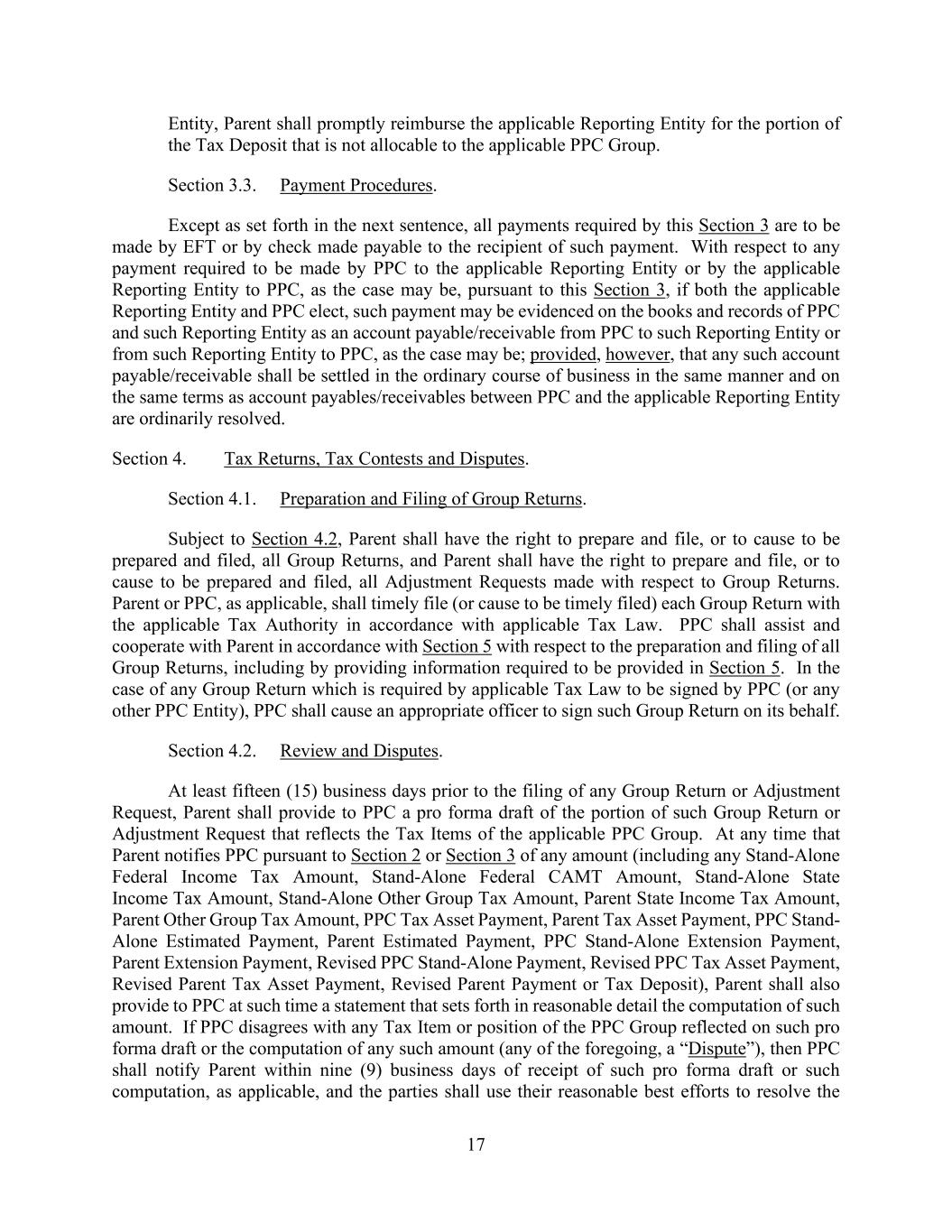
17 Entity, Parent shall promptly reimburse the applicable Reporting Entity for the portion of the Tax Deposit that is not allocable to the applicable PPC Group. Section 3.3. Payment Procedures. Except as set forth in the next sentence, all payments required by this Section 3 are to be made by EFT or by check made payable to the recipient of such payment. With respect to any payment required to be made by PPC to the applicable Reporting Entity or by the applicable Reporting Entity to PPC, as the case may be, pursuant to this Section 3, if both the applicable Reporting Entity and PPC elect, such payment may be evidenced on the books and records of PPC and such Reporting Entity as an account payable/receivable from PPC to such Reporting Entity or from such Reporting Entity to PPC, as the case may be; provided, however, that any such account payable/receivable shall be settled in the ordinary course of business in the same manner and on the same terms as account payables/receivables between PPC and the applicable Reporting Entity are ordinarily resolved. Section 4. Tax Returns, Tax Contests and Disputes. Section 4.1. Preparation and Filing of Group Returns. Subject to Section 4.2, Parent shall have the right to prepare and file, or to cause to be prepared and filed, all Group Returns, and Parent shall have the right to prepare and file, or to cause to be prepared and filed, all Adjustment Requests made with respect to Group Returns. Parent or PPC, as applicable, shall timely file (or cause to be timely filed) each Group Return with the applicable Tax Authority in accordance with applicable Tax Law. PPC shall assist and cooperate with Parent in accordance with Section 5 with respect to the preparation and filing of all Group Returns, including by providing information required to be provided in Section 5. In the case of any Group Return which is required by applicable Tax Law to be signed by PPC (or any other PPC Entity), PPC shall cause an appropriate officer to sign such Group Return on its behalf. Section 4.2. Review and Disputes. At least fifteen (15) business days prior to the filing of any Group Return or Adjustment Request, Parent shall provide to PPC a pro forma draft of the portion of such Group Return or Adjustment Request that reflects the Tax Items of the applicable PPC Group. At any time that Parent notifies PPC pursuant to Section 2 or Section 3 of any amount (including any Stand-Alone Federal Income Tax Amount, Stand-Alone Federal CAMT Amount, Stand-Alone State Income Tax Amount, Stand-Alone Other Group Tax Amount, Parent State Income Tax Amount, Parent Other Group Tax Amount, PPC Tax Asset Payment, Parent Tax Asset Payment, PPC Stand- Alone Estimated Payment, Parent Estimated Payment, PPC Stand-Alone Extension Payment, Parent Extension Payment, Revised PPC Stand-Alone Payment, Revised PPC Tax Asset Payment, Revised Parent Tax Asset Payment, Revised Parent Payment or Tax Deposit), Parent shall also provide to PPC at such time a statement that sets forth in reasonable detail the computation of such amount. If PPC disagrees with any Tax Item or position of the PPC Group reflected on such pro forma draft or the computation of any such amount (any of the foregoing, a “Dispute”), then PPC shall notify Parent within nine (9) business days of receipt of such pro forma draft or such computation, as applicable, and the parties shall use their reasonable best efforts to resolve the
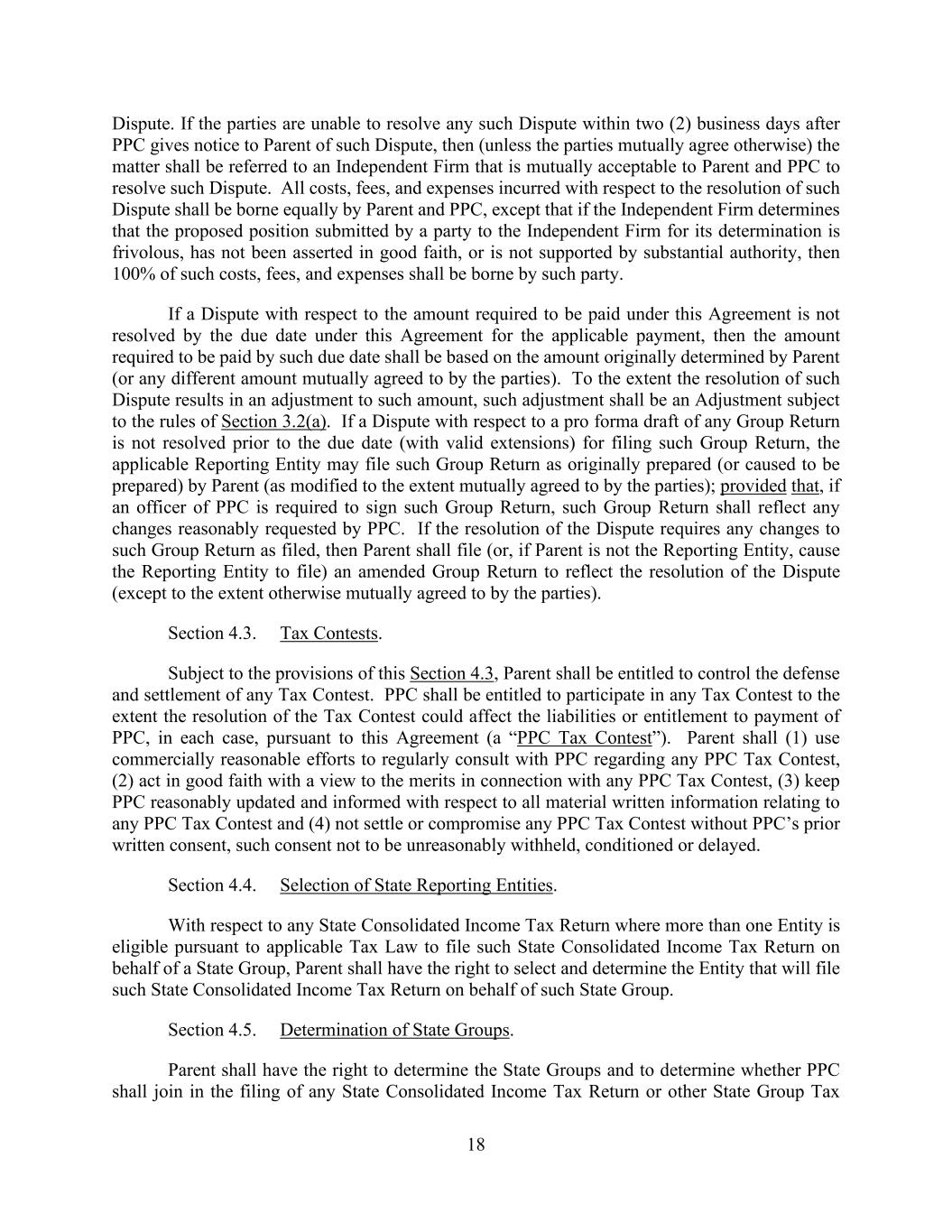
18 Dispute. If the parties are unable to resolve any such Dispute within two (2) business days after PPC gives notice to Parent of such Dispute, then (unless the parties mutually agree otherwise) the matter shall be referred to an Independent Firm that is mutually acceptable to Parent and PPC to resolve such Dispute. All costs, fees, and expenses incurred with respect to the resolution of such Dispute shall be borne equally by Parent and PPC, except that if the Independent Firm determines that the proposed position submitted by a party to the Independent Firm for its determination is frivolous, has not been asserted in good faith, or is not supported by substantial authority, then 100% of such costs, fees, and expenses shall be borne by such party. If a Dispute with respect to the amount required to be paid under this Agreement is not resolved by the due date under this Agreement for the applicable payment, then the amount required to be paid by such due date shall be based on the amount originally determined by Parent (or any different amount mutually agreed to by the parties). To the extent the resolution of such Dispute results in an adjustment to such amount, such adjustment shall be an Adjustment subject to the rules of Section 3.2(a). If a Dispute with respect to a pro forma draft of any Group Return is not resolved prior to the due date (with valid extensions) for filing such Group Return, the applicable Reporting Entity may file such Group Return as originally prepared (or caused to be prepared) by Parent (as modified to the extent mutually agreed to by the parties); provided that, if an officer of PPC is required to sign such Group Return, such Group Return shall reflect any changes reasonably requested by PPC. If the resolution of the Dispute requires any changes to such Group Return as filed, then Parent shall file (or, if Parent is not the Reporting Entity, cause the Reporting Entity to file) an amended Group Return to reflect the resolution of the Dispute (except to the extent otherwise mutually agreed to by the parties). Section 4.3. Tax Contests. Subject to the provisions of this Section 4.3, Parent shall be entitled to control the defense and settlement of any Tax Contest. PPC shall be entitled to participate in any Tax Contest to the extent the resolution of the Tax Contest could affect the liabilities or entitlement to payment of PPC, in each case, pursuant to this Agreement (a “PPC Tax Contest”). Parent shall (1) use commercially reasonable efforts to regularly consult with PPC regarding any PPC Tax Contest, (2) act in good faith with a view to the merits in connection with any PPC Tax Contest, (3) keep PPC reasonably updated and informed with respect to all material written information relating to any PPC Tax Contest and (4) not settle or compromise any PPC Tax Contest without PPC’s prior written consent, such consent not to be unreasonably withheld, conditioned or delayed. Section 4.4. Selection of State Reporting Entities. With respect to any State Consolidated Income Tax Return where more than one Entity is eligible pursuant to applicable Tax Law to file such State Consolidated Income Tax Return on behalf of a State Group, Parent shall have the right to select and determine the Entity that will file such State Consolidated Income Tax Return on behalf of such State Group. Section 4.5. Determination of State Groups. Parent shall have the right to determine the State Groups and to determine whether PPC shall join in the filing of any State Consolidated Income Tax Return or other State Group Tax
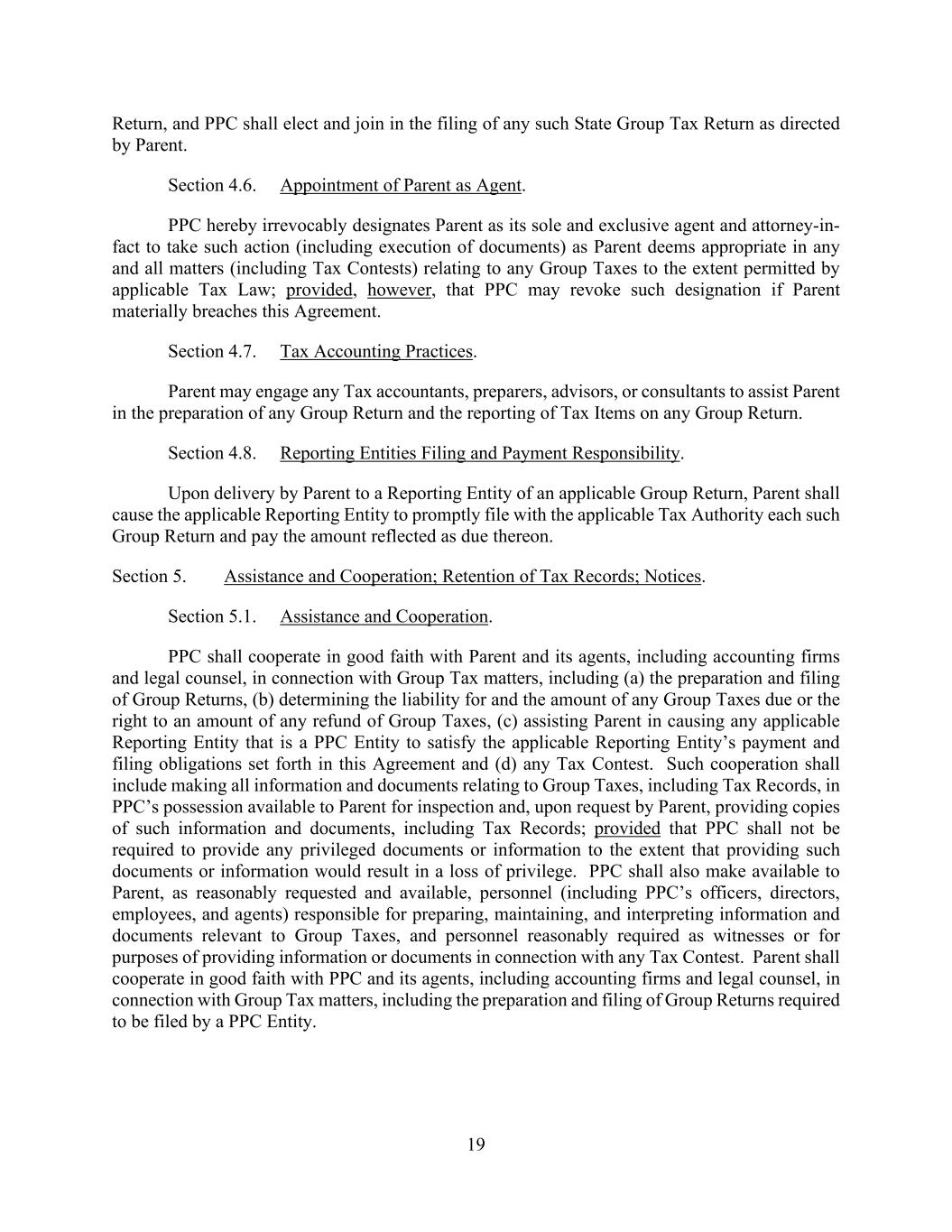
19 Return, and PPC shall elect and join in the filing of any such State Group Tax Return as directed by Parent. Section 4.6. Appointment of Parent as Agent. PPC hereby irrevocably designates Parent as its sole and exclusive agent and attorney-in- fact to take such action (including execution of documents) as Parent deems appropriate in any and all matters (including Tax Contests) relating to any Group Taxes to the extent permitted by applicable Tax Law; provided, however, that PPC may revoke such designation if Parent materially breaches this Agreement. Section 4.7. Tax Accounting Practices. Parent may engage any Tax accountants, preparers, advisors, or consultants to assist Parent in the preparation of any Group Return and the reporting of Tax Items on any Group Return. Section 4.8. Reporting Entities Filing and Payment Responsibility. Upon delivery by Parent to a Reporting Entity of an applicable Group Return, Parent shall cause the applicable Reporting Entity to promptly file with the applicable Tax Authority each such Group Return and pay the amount reflected as due thereon. Section 5. Assistance and Cooperation; Retention of Tax Records; Notices. Section 5.1. Assistance and Cooperation. PPC shall cooperate in good faith with Parent and its agents, including accounting firms and legal counsel, in connection with Group Tax matters, including (a) the preparation and filing of Group Returns, (b) determining the liability for and the amount of any Group Taxes due or the right to an amount of any refund of Group Taxes, (c) assisting Parent in causing any applicable Reporting Entity that is a PPC Entity to satisfy the applicable Reporting Entity’s payment and filing obligations set forth in this Agreement and (d) any Tax Contest. Such cooperation shall include making all information and documents relating to Group Taxes, including Tax Records, in PPC’s possession available to Parent for inspection and, upon request by Parent, providing copies of such information and documents, including Tax Records; provided that PPC shall not be required to provide any privileged documents or information to the extent that providing such documents or information would result in a loss of privilege. PPC shall also make available to Parent, as reasonably requested and available, personnel (including PPC’s officers, directors, employees, and agents) responsible for preparing, maintaining, and interpreting information and documents relevant to Group Taxes, and personnel reasonably required as witnesses or for purposes of providing information or documents in connection with any Tax Contest. Parent shall cooperate in good faith with PPC and its agents, including accounting firms and legal counsel, in connection with Group Tax matters, including the preparation and filing of Group Returns required to be filed by a PPC Entity.
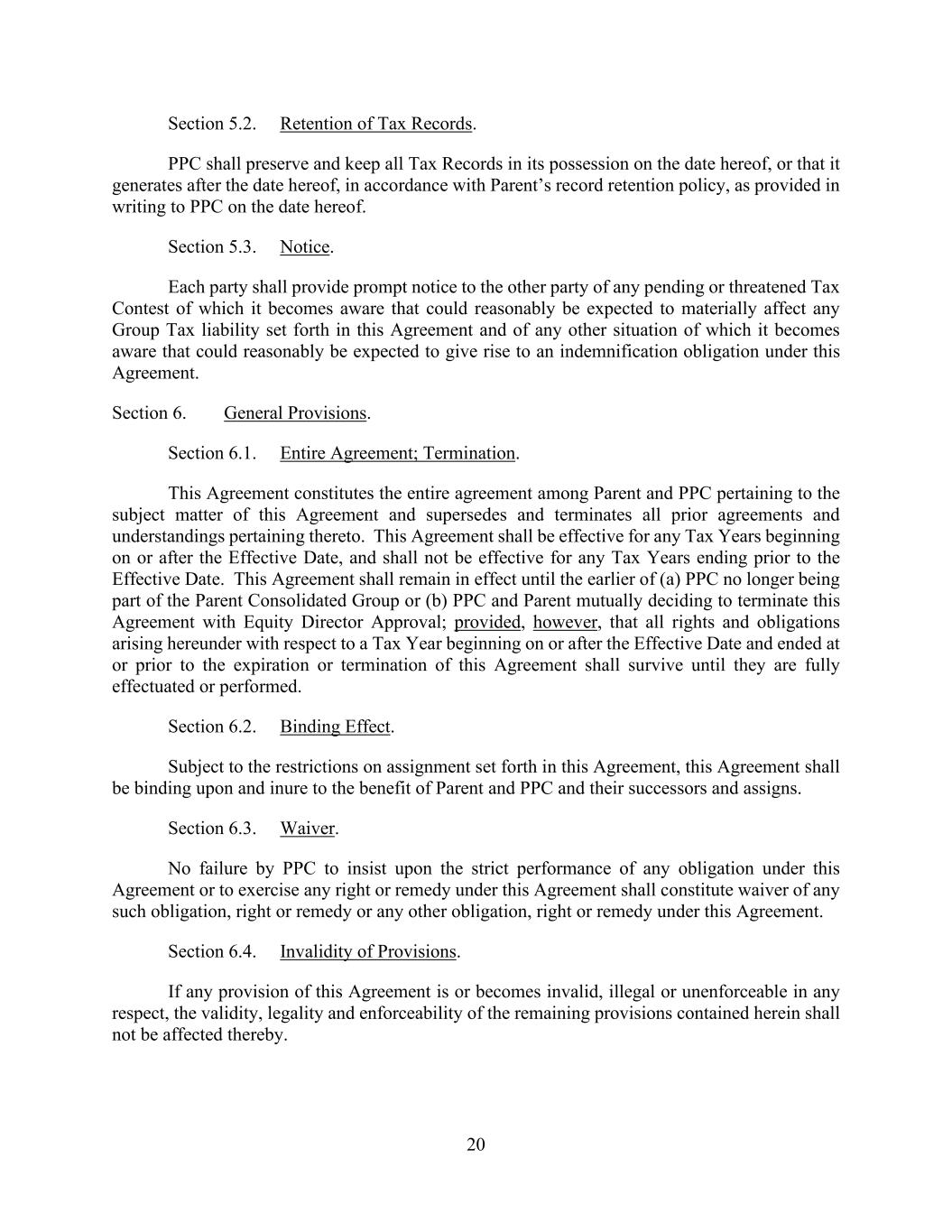
20 Section 5.2. Retention of Tax Records. PPC shall preserve and keep all Tax Records in its possession on the date hereof, or that it generates after the date hereof, in accordance with Parent’s record retention policy, as provided in writing to PPC on the date hereof. Section 5.3. Notice. Each party shall provide prompt notice to the other party of any pending or threatened Tax Contest of which it becomes aware that could reasonably be expected to materially affect any Group Tax liability set forth in this Agreement and of any other situation of which it becomes aware that could reasonably be expected to give rise to an indemnification obligation under this Agreement. Section 6. General Provisions. Section 6.1. Entire Agreement; Termination. This Agreement constitutes the entire agreement among Parent and PPC pertaining to the subject matter of this Agreement and supersedes and terminates all prior agreements and understandings pertaining thereto. This Agreement shall be effective for any Tax Years beginning on or after the Effective Date, and shall not be effective for any Tax Years ending prior to the Effective Date. This Agreement shall remain in effect until the earlier of (a) PPC no longer being part of the Parent Consolidated Group or (b) PPC and Parent mutually deciding to terminate this Agreement with Equity Director Approval; provided, however, that all rights and obligations arising hereunder with respect to a Tax Year beginning on or after the Effective Date and ended at or prior to the expiration or termination of this Agreement shall survive until they are fully effectuated or performed. Section 6.2. Binding Effect. Subject to the restrictions on assignment set forth in this Agreement, this Agreement shall be binding upon and inure to the benefit of Parent and PPC and their successors and assigns. Section 6.3. Waiver. No failure by PPC to insist upon the strict performance of any obligation under this Agreement or to exercise any right or remedy under this Agreement shall constitute waiver of any such obligation, right or remedy or any other obligation, right or remedy under this Agreement. Section 6.4. Invalidity of Provisions. If any provision of this Agreement is or becomes invalid, illegal or unenforceable in any respect, the validity, legality and enforceability of the remaining provisions contained herein shall not be affected thereby.
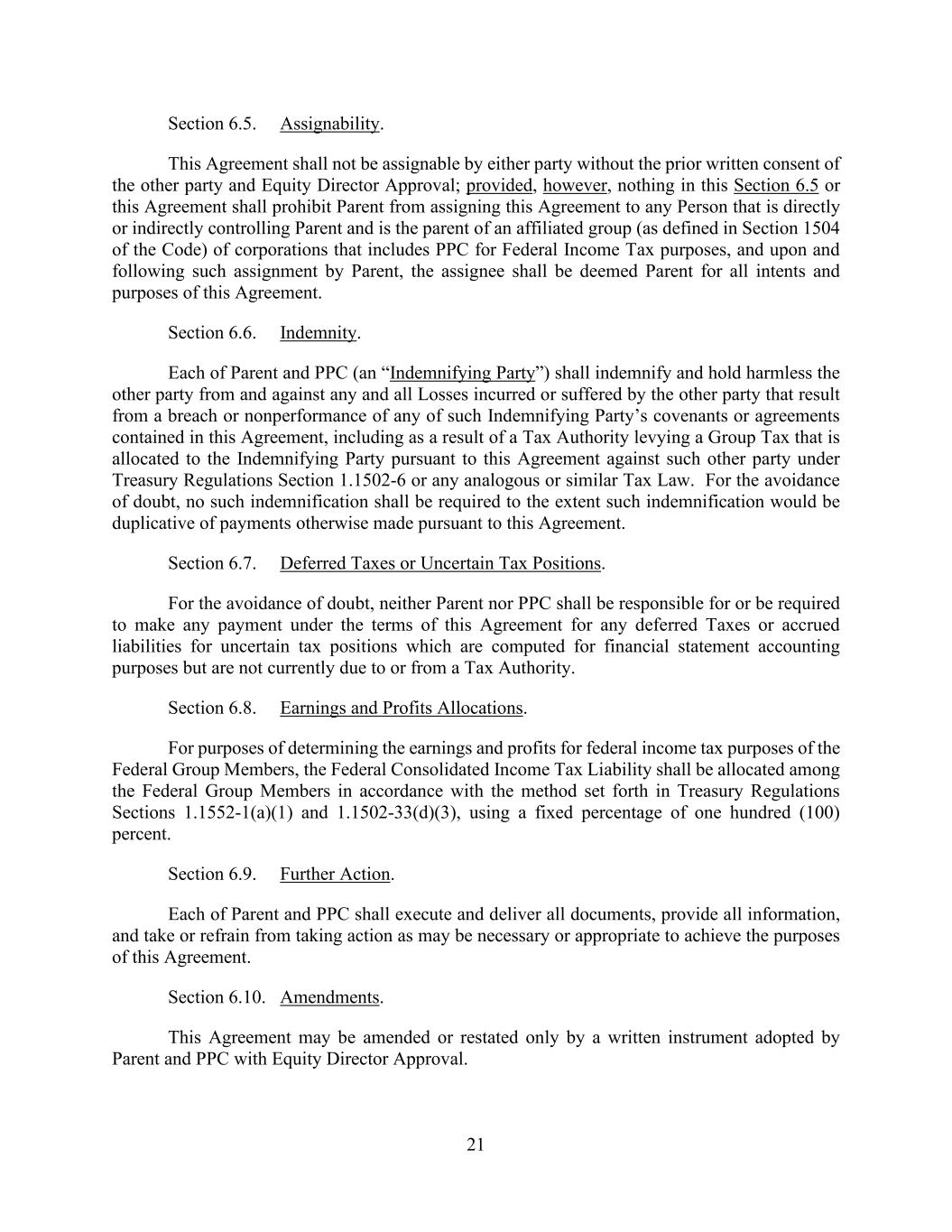
21 Section 6.5. Assignability. This Agreement shall not be assignable by either party without the prior written consent of the other party and Equity Director Approval; provided, however, nothing in this Section 6.5 or this Agreement shall prohibit Parent from assigning this Agreement to any Person that is directly or indirectly controlling Parent and is the parent of an affiliated group (as defined in Section 1504 of the Code) of corporations that includes PPC for Federal Income Tax purposes, and upon and following such assignment by Parent, the assignee shall be deemed Parent for all intents and purposes of this Agreement. Section 6.6. Indemnity. Each of Parent and PPC (an “Indemnifying Party”) shall indemnify and hold harmless the other party from and against any and all Losses incurred or suffered by the other party that result from a breach or nonperformance of any of such Indemnifying Party’s covenants or agreements contained in this Agreement, including as a result of a Tax Authority levying a Group Tax that is allocated to the Indemnifying Party pursuant to this Agreement against such other party under Treasury Regulations Section 1.1502-6 or any analogous or similar Tax Law. For the avoidance of doubt, no such indemnification shall be required to the extent such indemnification would be duplicative of payments otherwise made pursuant to this Agreement. Section 6.7. Deferred Taxes or Uncertain Tax Positions. For the avoidance of doubt, neither Parent nor PPC shall be responsible for or be required to make any payment under the terms of this Agreement for any deferred Taxes or accrued liabilities for uncertain tax positions which are computed for financial statement accounting purposes but are not currently due to or from a Tax Authority. Section 6.8. Earnings and Profits Allocations. For purposes of determining the earnings and profits for federal income tax purposes of the Federal Group Members, the Federal Consolidated Income Tax Liability shall be allocated among the Federal Group Members in accordance with the method set forth in Treasury Regulations Sections 1.1552-1(a)(1) and 1.1502-33(d)(3), using a fixed percentage of one hundred (100) percent. Section 6.9. Further Action. Each of Parent and PPC shall execute and deliver all documents, provide all information, and take or refrain from taking action as may be necessary or appropriate to achieve the purposes of this Agreement. Section 6.10. Amendments. This Agreement may be amended or restated only by a written instrument adopted by Parent and PPC with Equity Director Approval.
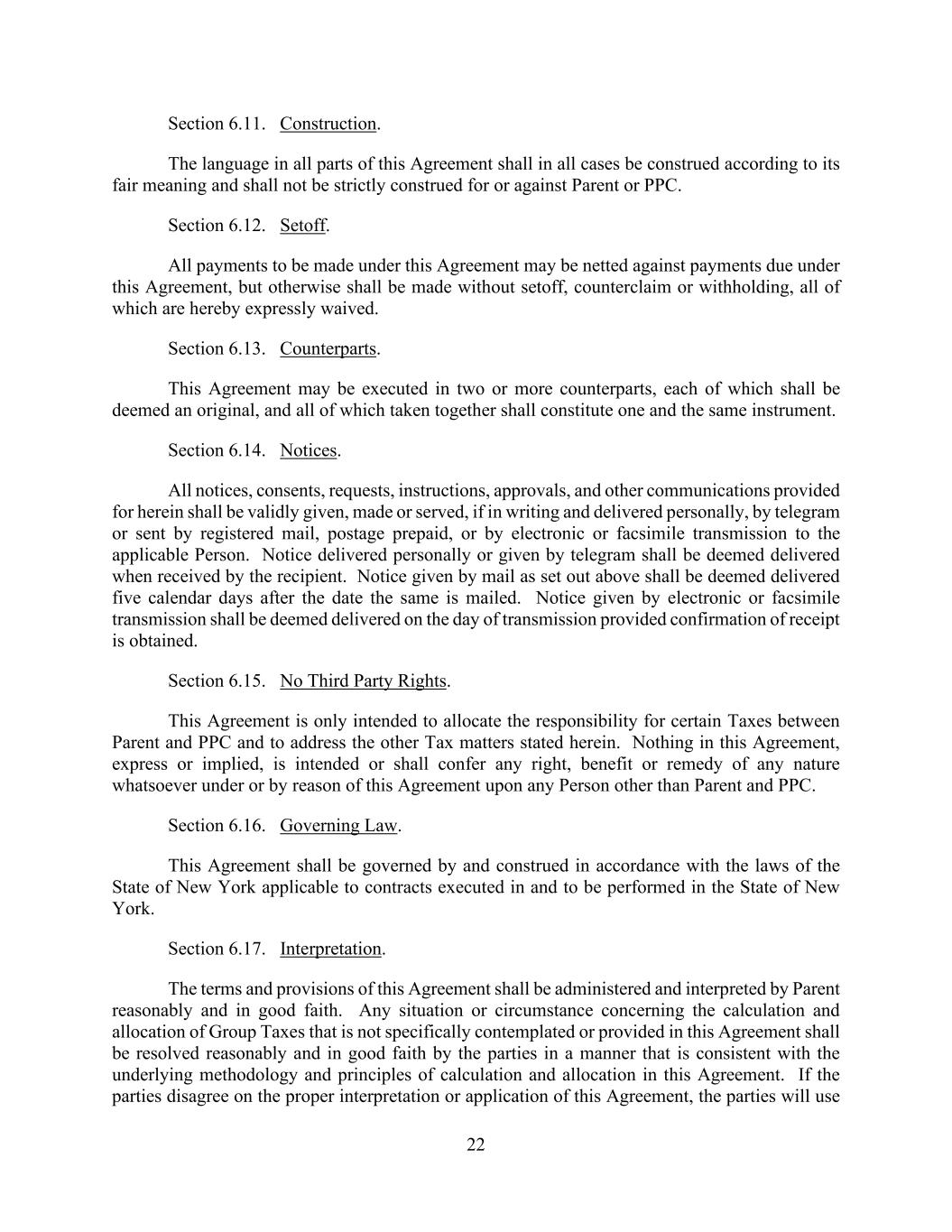
22 Section 6.11. Construction. The language in all parts of this Agreement shall in all cases be construed according to its fair meaning and shall not be strictly construed for or against Parent or PPC. Section 6.12. Setoff. All payments to be made under this Agreement may be netted against payments due under this Agreement, but otherwise shall be made without setoff, counterclaim or withholding, all of which are hereby expressly waived. Section 6.13. Counterparts. This Agreement may be executed in two or more counterparts, each of which shall be deemed an original, and all of which taken together shall constitute one and the same instrument. Section 6.14. Notices. All notices, consents, requests, instructions, approvals, and other communications provided for herein shall be validly given, made or served, if in writing and delivered personally, by telegram or sent by registered mail, postage prepaid, or by electronic or facsimile transmission to the applicable Person. Notice delivered personally or given by telegram shall be deemed delivered when received by the recipient. Notice given by mail as set out above shall be deemed delivered five calendar days after the date the same is mailed. Notice given by electronic or facsimile transmission shall be deemed delivered on the day of transmission provided confirmation of receipt is obtained. Section 6.15. No Third Party Rights. This Agreement is only intended to allocate the responsibility for certain Taxes between Parent and PPC and to address the other Tax matters stated herein. Nothing in this Agreement, express or implied, is intended or shall confer any right, benefit or remedy of any nature whatsoever under or by reason of this Agreement upon any Person other than Parent and PPC. Section 6.16. Governing Law. This Agreement shall be governed by and construed in accordance with the laws of the State of New York applicable to contracts executed in and to be performed in the State of New York. Section 6.17. Interpretation. The terms and provisions of this Agreement shall be administered and interpreted by Parent reasonably and in good faith. Any situation or circumstance concerning the calculation and allocation of Group Taxes that is not specifically contemplated or provided in this Agreement shall be resolved reasonably and in good faith by the parties in a manner that is consistent with the underlying methodology and principles of calculation and allocation in this Agreement. If the parties disagree on the proper interpretation or application of this Agreement, the parties will use
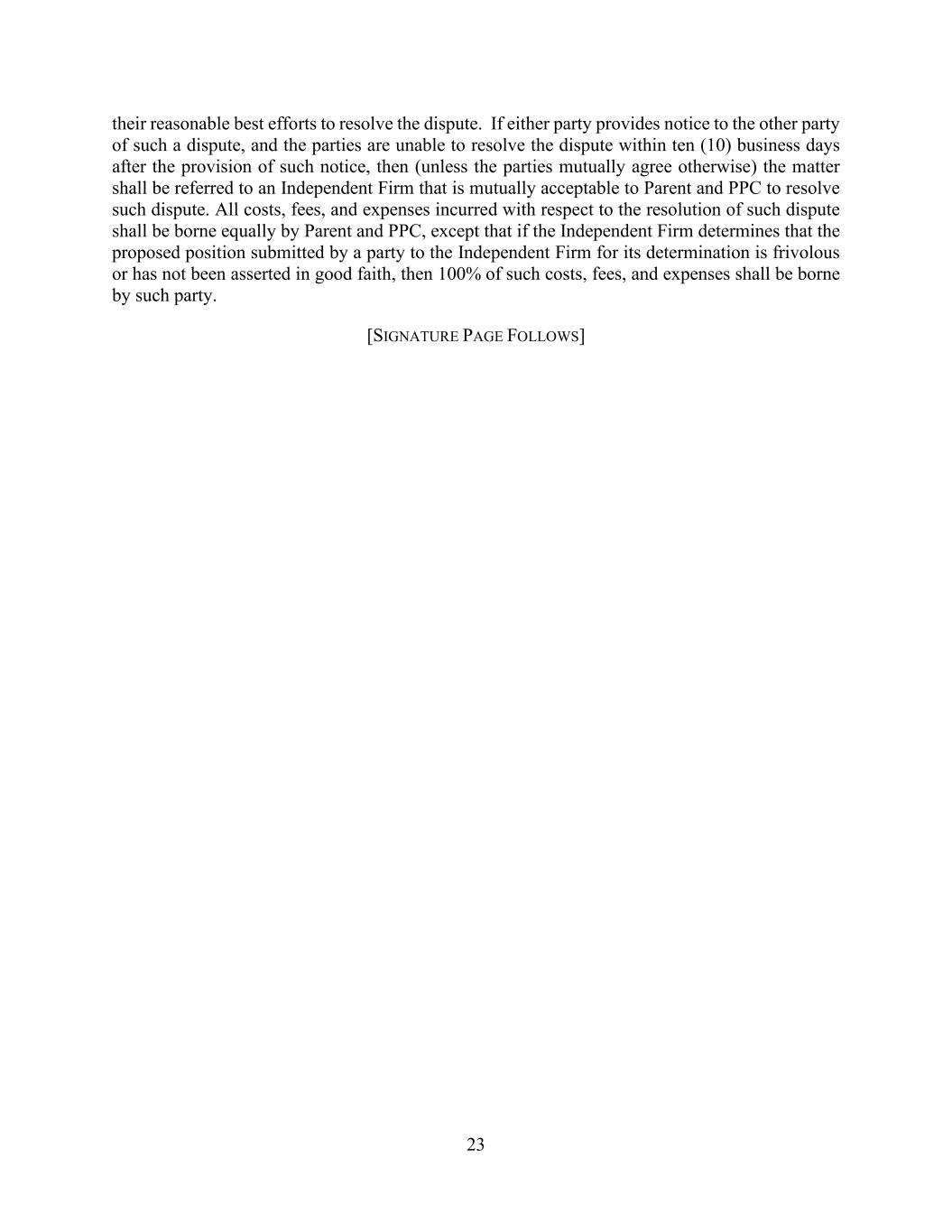
23 their reasonable best efforts to resolve the dispute. If either party provides notice to the other party of such a dispute, and the parties are unable to resolve the dispute within ten (10) business days after the provision of such notice, then (unless the parties mutually agree otherwise) the matter shall be referred to an Independent Firm that is mutually acceptable to Parent and PPC to resolve such dispute. All costs, fees, and expenses incurred with respect to the resolution of such dispute shall be borne equally by Parent and PPC, except that if the Independent Firm determines that the proposed position submitted by a party to the Independent Firm for its determination is frivolous or has not been asserted in good faith, then 100% of such costs, fees, and expenses shall be borne by such party. [SIGNATURE PAGE FOLLOWS]
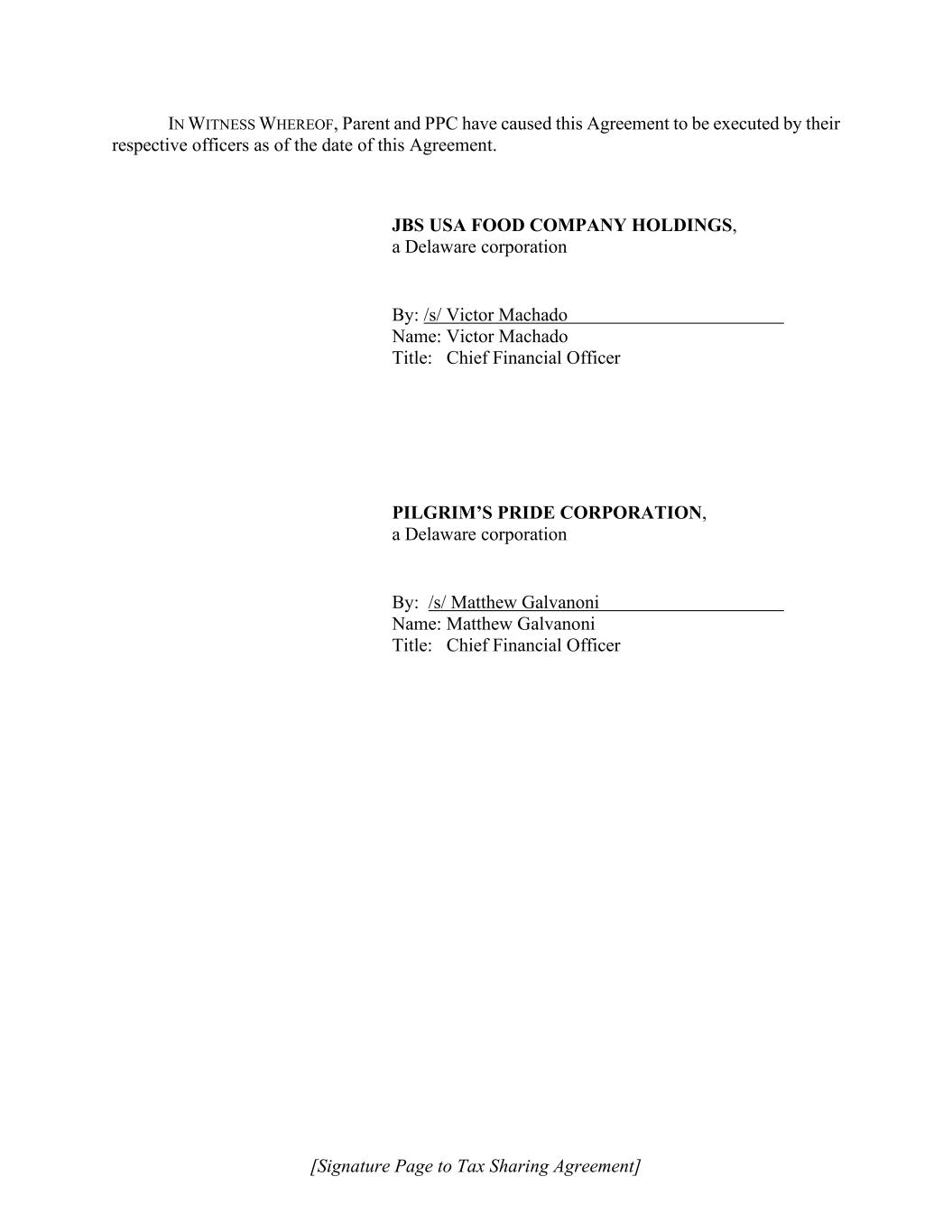
[Signature Page to Tax Sharing Agreement] IN WITNESS WHEREOF, Parent and PPC have caused this Agreement to be executed by their respective officers as of the date of this Agreement. JBS USA FOOD COMPANY HOLDINGS, a Delaware corporation By: /s/ Victor Machado Name: Victor Machado Title: Chief Financial Officer PILGRIM’S PRIDE CORPORATION, a Delaware corporation By: /s/ Matthew Galvanoni Name: Matthew Galvanoni Title: Chief Financial Officer


























